Public opinion survey
This page has been archived on the Web
Information identified as archived is provided for reference, research or recordkeeping purposes. It is not subject to the Government of Canada Web Standards and has not been altered or updated since it was archived. Please contact us to request a format other than those available.
Survey of Canadians on Privacy-Related Issues
Final Report
Prepared for the Office of the Privacy Commissioner of Canada
Phoenix SPI
January 2013
Executive Summary
The Office of the Privacy Commissioner of Canada commissioned Phoenix Strategic Perspectives Inc. to conduct a survey of Canadians on privacy-related issues. The purpose of the survey was to explore Canadians’ awareness, understanding and perceptions of privacy-related issues. A random digit dialling (RDD) telephone survey was administered to 1,513 Canadian residents, 16 years of age or older. Based on a sample of this size, the overall results can be considered to be accurate within ±2.5%, 19 times out of 20. The fieldwork was conducted October 25th to November 12th, 2012. The research results will be used to assist in evaluating and refining OPC programs and services targeting Canadians and to facilitate its communications and outreach efforts with this audience.
General awareness and perceptions
Canadians’ knowledge about their privacy rights under Canada’s privacy laws is limited, although improving. While one-third (35%) rated their knowledge relatively highly (scores of 5-7 on a 7-point scale), a clear majority (63%) rated their knowledge low on the scale or in the neutral range. Compared to previous years, Canadians’ understanding of their privacy rights is higher than it has been in the past – 35% vs. 28-30% in 2009-2011 (and lower before that).
Two-thirds of Canadians are concerned about the protection of their privacy, with one-quarter saying they are extremely concerned. In terms of the risks to personal privacy that concern Canadians the most, financial information/bank fraud tops the list, with nearly a quarter citing it (23%). An additional 10% mentioned credit card fraud. Following this, the top concerns identified were computer privacy/Internet security (21%) and identity theft (20%).
There is a growing sense amongst Canadians that their ability to protect their personal information is diminishing. Seven in ten think that their personal information has less protection in their daily lives than it did ten years ago, an increase of 10% since 2011 (but similar to previous years). As well, the majority (56%) are not confident that they have enough information to know how new technologies affect their personal privacy, which is the highest expression of a lack of confidence for this question since tracking began in 2000.
Looking ahead, 71% think that protecting the personal information of Canadians will be one of the most important issues facing our country in the next ten years. This finding reflects a steady increase since 2009, when 62% of Canadians agreed with this statement. Despite placing heavy importance on privacy issues, only 21% have ever sought out information about their privacy rights.
Many Canadians are reluctant to share their personal information with organizations (57% never or rarely do so), and most (60%) have asked for an explanation of how an organization will use their information. Canadians are uncertain whether they would be notified if the personal information they have given an organization were lost, stolen or unintentionally exposed: 59% think it unlikely; 41% think it probable. However, virtually all Canadians (97%) would want to be notified if the personal information they had given to an organization were compromised.
Overall, Canadians offered mixed perceptions of the seriousness that the federal government and businesses apply to their responsibilities to protect personal information. Using a 7-point scale, 64% offered middling scores on the scale (i.e. scores of 3-5) to government. Only 21% think the federal government takes its privacy-related responsibilities very seriously. Though similar, perceptions of how seriously businesses take their responsibility to protect consumer personal information are somewhat less favorable than for government. Since 2006, perceptions in this area have gradually improved.
Canadians’ awareness of federal privacy institutions is relatively low, but rising. Seven in ten Canadians are not aware of any federal institutions that help them with privacy and the protection of personal information from inappropriate collection, use and disclosure. However, since 2005, Canadians’ level of awareness has risen overall. Of those who claimed to be aware of a federal privacy institution, 15% were able to identify the OPC by name.
Online information
In total, 12% of Canadians say they have been negatively affected by information posted about them online. Internet users expressed mixed levels of concern about posting a range of information online. The majority are very concerned about posting information about their location (55%) and contact information (51%). This is followed by concern about posting personal photos or videos (48%) and information about social activities (41%). Canadians appear to be least concerned about posting their personal opinions about people, issues and things (32%).
Canadians expressed at least moderate levels of concern about different ways the information available about them online could be used. Companies using their information to send them spam topped the list, with fully 73% of Internet users expressing strong concern about this. Canadians are least concerned about law enforcement or national security agencies collecting their personal information for use in a specific investigation with a warrant (27% very concerned). However, levels of concern are much higher if these same bodies collect Canadians’ personal information for general surveillance purposes without a warrant (55% very concerned).
Behavioural advertising and tracking
Most Canadians are aware that their Internet activities, such as their browsing, searches, purchases, and service interactions can be tracked by the websites they visit, both commercial and government (73%) and, to a lesser extent, other companies, such as marketers and researchers (63%). That said, most (54%) have not taken any steps to limit such tracking.
Showing a clear popular perspective, 92% of Canadians think that Internet companies should have to ask their permission to track what they do on the Internet. A strong majority (81%) think it is very important for websites to actively inform them about what kinds of personal information they are collecting and how they use it. Virtually no one attributes low importance to this.
Privacy policies
Despite a strong sense of the importance of websites informing them about the kinds of personal information they collect and how they use it, most Canadians do not consult websites’ privacy policies with much frequency: fully half do so rarely or never. Conversely, only 21% do this always or often.
Perhaps contributing to this tendency is the perspective amongst most Canadians that websites’ privacy policies are unclear. Sixty-two percent of Canadians feel that the privacy policies of Internet sites they visit are somewhat or very vague in terms of giving them the information about what the company will do with their personal information. This perspective has grown since the last survey (62% vs. 53%).
Sixty-eight percent of Canadians have chosen not to use a site or a service because they were uncomfortable with the terms that were set out in the privacy policy.
Mobile devices
The three-quarters of Canadians who use mobile devices are increasingly likely to use privacy protection measures. The majority of these people are likely to use a password to lock it (56%) and to adjust settings of the device or apps to limit the amount of personal information they share with others (53%). This reflects significant increases in the use of such measures since 2011.
The majority of mobile users (55%) have decided not to install, or have uninstalled, an app because of the amount of personal information they would have to provide. A smaller proportion (38%) have turned off the location tracking feature on their mobile device because they were concerned about others accessing that information.
While half of mobile users think the information stored on their mobile device is about as private as the information stored on their home computer, 32% think that it is less private. Interestingly, 13% think such information is more private on their mobile device.
National security and public safety
When asked how comfortable they are with police and intelligence agencies being able to require telecommunications companies to disclose various types of subscriber information without a warrant, Canadians were divided. And, in general, the response results for the various types of information did not vary much. They are most likely to be comfortable with telecoms releasing names and phone numbers (30-31% are very comfortable with this), followed closely by their address, email address and IP address (27-29%). Nevertheless, the proportion of Canadians who expressed a clear lack of comfort with respect to each of these items is significant, ranging from 39-44%.
Survey respondents were also asked about their level of comfort with law enforcement agencies being able to require organizations to disclose personal information, without a warrant, for a variety of purposes. Canadians are most likely to be comfortable with law enforcement agencies obtaining this information in order to locate vulnerable persons – both young persons who have run away and persons who may be a danger to themselves or others. In total, 63% and 58% respectively said they were very comfortable with this (scores of 6-7 on 7-point scale). Canadians are much less comfortable with such information being disclosed as evidence for an investigation into a minor infraction (24%), in sharp contrast to the much higher comfort levels with personal information being disclosed for an investigation into a serious offence (49%). Canadians also reported being relatively uncomfortable with law enforcement agencies wanting to gather information about a person’s online activities (25%).
Unmanned aerial vehicles
Most Canadians are very comfortable with the use of Unmanned Aerial Vehicles to help with search and rescue missions (81%), to patrol the border (66%), and for law enforcement investigations (54%). They are less comfortable with the use of UAVs for more generally monitoring the public, such as at events or protests (42%), or for general surveillance of public spaces (35%). Note that for uses related to public monitoring, one in five or more (19-24%) said they were not really comfortable with this at all.
Genetic privacy
Fifty-two percent of surveyed Canadians expressed strong concern that, if their doctor recommended that they undergo genetic testing, they might be asked to provide the results for non-health related purposes. In total, 71% of those who expressed significant concern (scores of 5-7 on 7-point scale) said their concerns would likely affect their willingness to undergo genetic testing. More than half of these, 43%, said that this was definitely the case.
Demographic variations
Demographic subgroup variations were most evident by age and education—that is, they were consistent and pronounced across many of the issues. The youngest Canadians—16-24 year olds—were more apt to lack awareness of federal privacy institutions, less likely to have concerns about privacy, and more likely to engage in behaviours that present greater risks to personal information. In addition, those under 25 years were more apt to hold positive impressions of government and business performance vis-à-vis protecting privacy, lack knowledge of potential online risks, and not have taken steps to protect themselves online. Turning to education, awareness of federal privacy institutions increased with education, as did awareness of Internet tracking. Underscoring this awareness, concern about privacy protection was higher among college and university graduates. Furthermore, post-secondary graduates were more apt to have sought information about their privacy rights and taken steps to limit disclosure of personal information online (e.g., turning off location trackers on mobile devices). In short, when looking at differences based on age and education, there is a clear connection among awareness levels, perceived concern, and behaviour.
Introduction
Phoenix Strategic Perspectives Inc. was commissioned by the Office of the Privacy Commissioner of Canada (OPC) to conduct quantitative research with Canadians on privacy-related issues.
Background and Objectives
The Office of the Privacy Commissioner of Canada wanted to conduct a survey of Canadians on privacy-related issues. This is a tracking study, with the most recent previous wave having been conducted in 2011. The purpose of the survey was to gauge Canadians’ understanding and awareness of privacy issues, legislation and federal privacy institutions. The OPC identified four priority areas on which the survey’s questions focused:
- Identity integrity and privacy;
- Information technology and privacy;
- Genetic information and privacy; and
- Public safety and privacy.
For each of these areas, the focus was on individuals’ levels of awareness, understanding and concerns, and where appropriate, relevant behaviours. The results will be used to assist in evaluating and refining OPC programs and services targeting Canadians and to facilitate its communications and outreach efforts with this audience.
Methodology
A random digit dialling (RDD) telephone survey was administered to 1,513 Canadian residents, 16 years of age or older. Cell phone numbers were included in the sample frame. Based on a sample of this size, the overall results can be considered to be accurate within ±2.5%, 19 times out of 20. The margin of error is greater for results pertaining to subgroups of the total sample. The fieldwork was conducted October 25th to November 12th, 2012. The average length of the interviews was 16.75 minutes.
Notes to readers
- Reference is made to findings from similar surveys conducted in previous years. When comparing results over time, it should be kept in mind that the sample for this year’s survey differed from the sample in previous years given that 20% of the sample consisted of cell phone numbers.
- Throughout the report, percentages may not always add to 100 due to rounding.
- Due to rounding, some percentages in the report may not match those presented in the tabulated data (available under separate cover).
- When reporting sub-group variations, only differences that are significant at the 95% confidence level and/or indicative of a pattern are discussed in the report.
Appended to the report is a detailed description of the methodology (Appendix 1), as well as copies of the questionnaire in English and French (Appendix 2). In addition, a full set of data tables has been provided under separate cover.
General Awareness and Perceptions of Privacy
This section addresses Canadians’ awareness of privacy laws, their concern about personal privacy, and perceptions of general privacy issues. Questions in this section were asked of all respondents.
Limited knowledge about privacy laws
Canadians were asked to rate their knowledge of their privacy rights under the various laws protecting their personal information (using a 7-point scale; 1 = very poor, 7 = very good). Over one-third (35%) rated their knowledge relatively highly (scores of 5-7). However, a clear majority (63%) rated their knowledge low on the scale or in the neutral range.
Compared to previous years, Canadians’ understanding of their privacy rights is higher than it has been in the past – 35% vs. 28-30% in 2009-2011 (and lower before that).
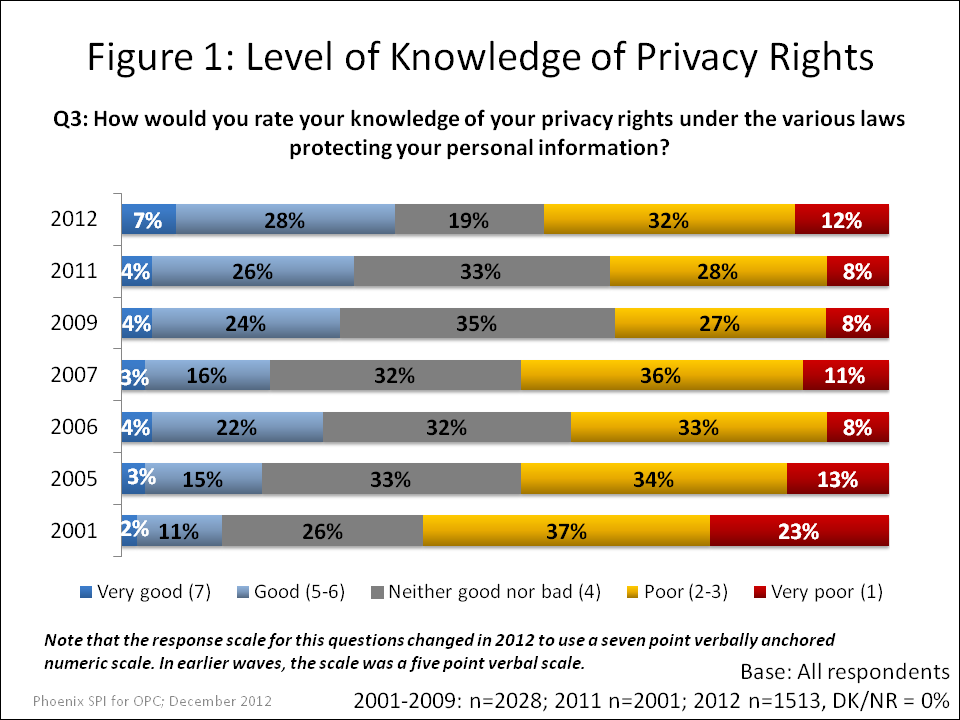
Text version
Figure 1: Level of Knowledge of Privacy Rights
Q3: How would you rate your knowledge of your privacy rights under the various laws protecting your personal information?
| Year | Very good (7) | Good (5-6) | Neither good nor bad (4) | Poor (2-3) | Very poor (1) |
|---|---|---|---|---|---|
| 2001 | 2% | 11% | 26% | 37% | 23% |
| 2005 | 3% | 15% | 33% | 34% | 13% |
| 2006 | 4% | 22% | 32% | 33% | 8% |
| 2007 | 3% | 16% | 32% | 36% | 11% |
| 2009 | 4% | 24% | 35% | 27% | 8% |
| 2011 | 4% | 26% | 33% | 28% | 8% |
| 2012 | 7% | 28% | 19% | 32% | 12% |
Note that the response scale for this questions changed in 2012 to use a seven point verbally anchored numeric scale. In earlier waves, the scale was a five point verbal scale.
Base: All respondents
2001-2009: n=2028; 2011 n=2001; 2012 n=1513, DK/NR = 0%
Reported knowledge of privacy rights (scores of 5-7) increased from east to west (from 31% in Atlantic Canada to 40% in British Columbia), and was higher among those with a registered apprenticeship or trades education (41% vs. 35% of high school graduates and 32-33% of college and university graduates).
Canadians express high levels of concern over personal privacy
Two-thirds of Canadians are relatively concerned about the protection of their privacy. When asked to rate their level of concern on a 7-point scale, 66% expressed a significant level of concern. Fully one-quarter said they were extremely concerned.
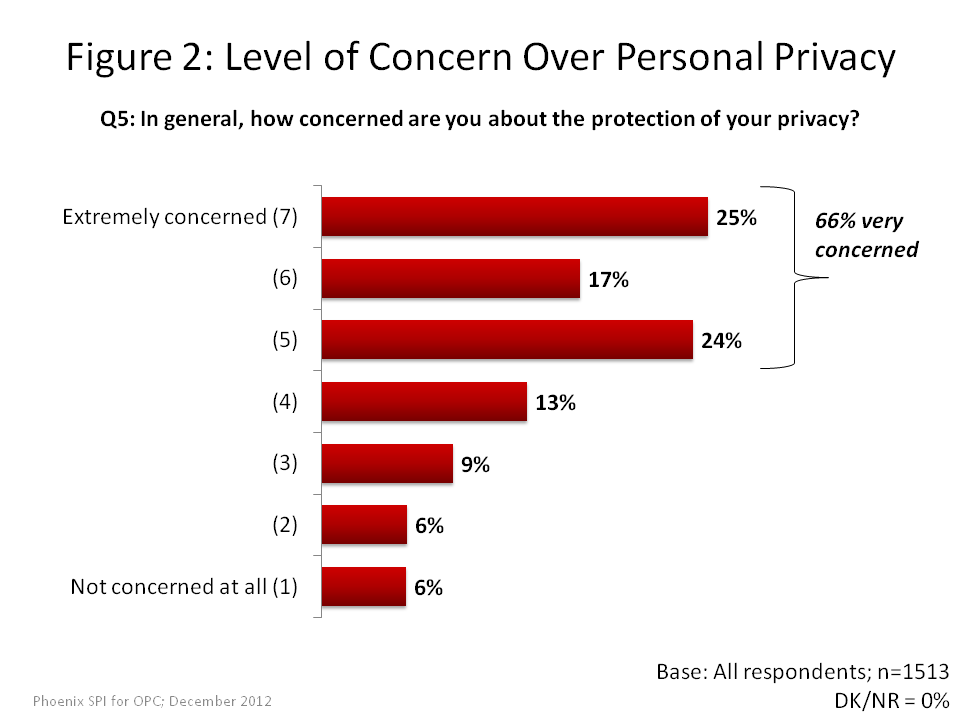
Text version
Figure 2: Level of Concern Over Personal Privacy
Q5: In general, how concerned are you about the protection of your privacy?
| Level of Concern | % |
|---|---|
| Not concerned at all (1) | 6% |
| (2) | 6% |
| (3) | 9% |
| (4) | 13% |
| (5) | 24% |
| (6) | 17% |
| Extremely concerned (7) | 25% |
Base: All respondents; n=1513
DK/NR = 0%
Concern about privacy protection (scores of 6-7) was higher among women (45%), college (46%) and university graduates (44%), and Ontarians (48%) compared to Quebeckers (39%) and British Columbians (35%). It also increased with age (from 27% of those under 25 to 46% of those 55+).
Top privacy concerns relate to finances, online security and identity theft
Canadians were asked, in an open-ended manner, what risks to their own privacy concerned them the most (multiple responses accepted). Financial information/bank fraud topped the list, with nearly a quarter citing it (23%). An additional 10% mentioned credit card fraud. Following this, one in five mentioned each of computer privacy/Internet security (21%) and identity theft (20%).
Other responses focused on a range of relatively specific issues related to the collection and use of personal information.

Text version
Figure 3: Perceived Risks to Privacy of Greatest Concern
Q4: What risks to your privacy concern you the most, if any?
| Risks | % |
|---|---|
| Financial information/ bank fraud | 23% |
| Computer privacy/ internet security | 21% |
| Identity theft/ identity fraud | 20% |
| Personal information being accessed (general) | 15% |
| Credit card fraud | 10% |
| Nothing | 9% |
| Personal information being collected/ shared | 8% |
| Telephone privacy | 6% |
| Government involvement | 4% |
| Social insurance number/ SIN | 4% |
| Advertising/ sales/ marketing | 4% |
| Monitoring/ activity tracking | 3% |
| Health/ medical information | 3% |
| Other | 5% |
| DK/NR | 17% |
Base: All; n=1513
When it comes to privacy risks, Quebeckers were less likely to have concerns about bank fraud and other types of financial breaches (14% compared to 19% of British Columbians and 26-29% of other Canadians) and were more inclined to be concerned about identity theft and related fraud (24% compared to 14% of Atlantic Canadians and 18-20% of others). The likelihood of having concerns about financial breaches/fraud increased with age, from 14% of those under 25 to 27% of those 55+. The risk of identity theft concerned 25-54 years olds more than any other age group, as well as college and university graduates (23% each) compared to less-educated Canadians (13-17%), and women (23% vs. 16% of men).
Growing sense that protection of personal information is diminishing
Seven in ten Canadians feel that they have less protection of their personal information in their daily lives than they did ten years ago. This reflects a 10% increase since 2011.
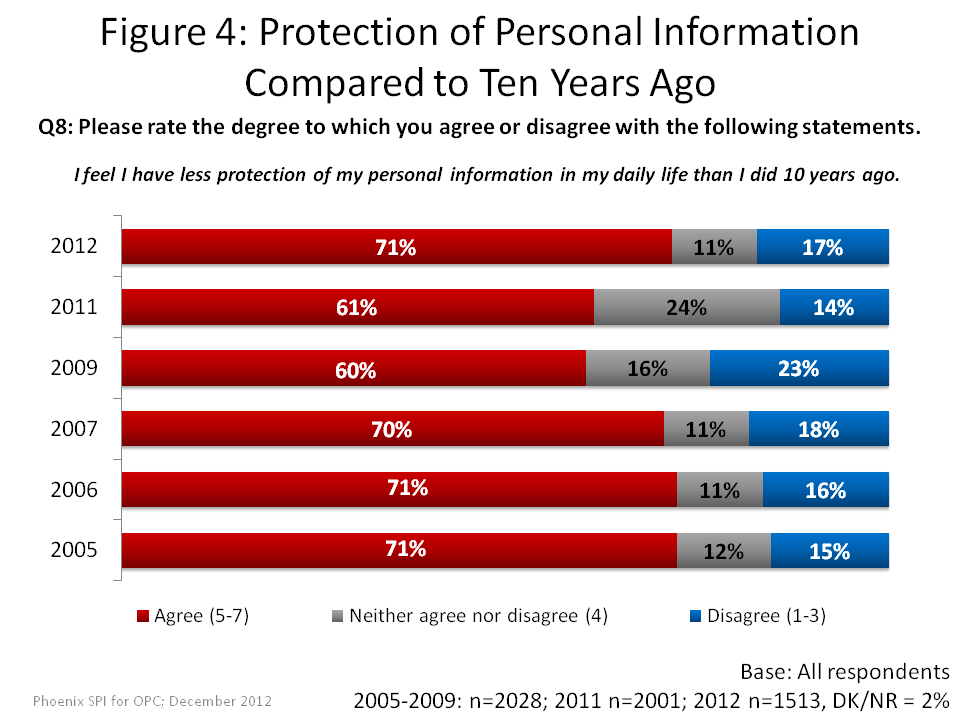
Text version
Figure 4: Protection of Personal Information Compared to Ten Years Ago
Q8: Please rate the degree to which you agree or disagree with the following statements.
I feel I have less protection of my personal information in my daily life than I did 10 years ago.
| Year | Agree (5-7) | Neither agree nor disagree (4) | Disagree (1-3) |
|---|---|---|---|
| 2005 | 71% | 12% | 15% |
| 2006 | 71% | 11% | 16% |
| 2007 | 70% | 11% | 18% |
| 2009 | 60% | 16% | 23% |
| 2011 | 61% | 24% | 14% |
| 2012 | 71% | 11% | 17% |
Base: All respondents
2005-2009: n=2028; 2011 n=2001; 2012 n=1513, DK/NR = 2%
The likelihood of strongly feeling this way (scores of 6-7) increased with age, from 35% of 16-24 year olds to 51% of those 55+, knowledge of privacy rights (from 43% to 59%), and concern about privacy protection (from 28% to 62%). Additionally, AllophonesFootnote 1 (71%), college (55%) and high school graduates (52%) compared to university graduates (39%), as well as women (50% vs. 43% of men) were more apt to agree strongly about the increasing importance of protecting privacy.
Most not confident about knowledge of privacy implications of new technologies
The majority of Canadians (56%) are not confident that they have enough information to know how new technologies affect their personal privacy. This is the highest expression of a lack of confidence in this since tracking began in 2000.
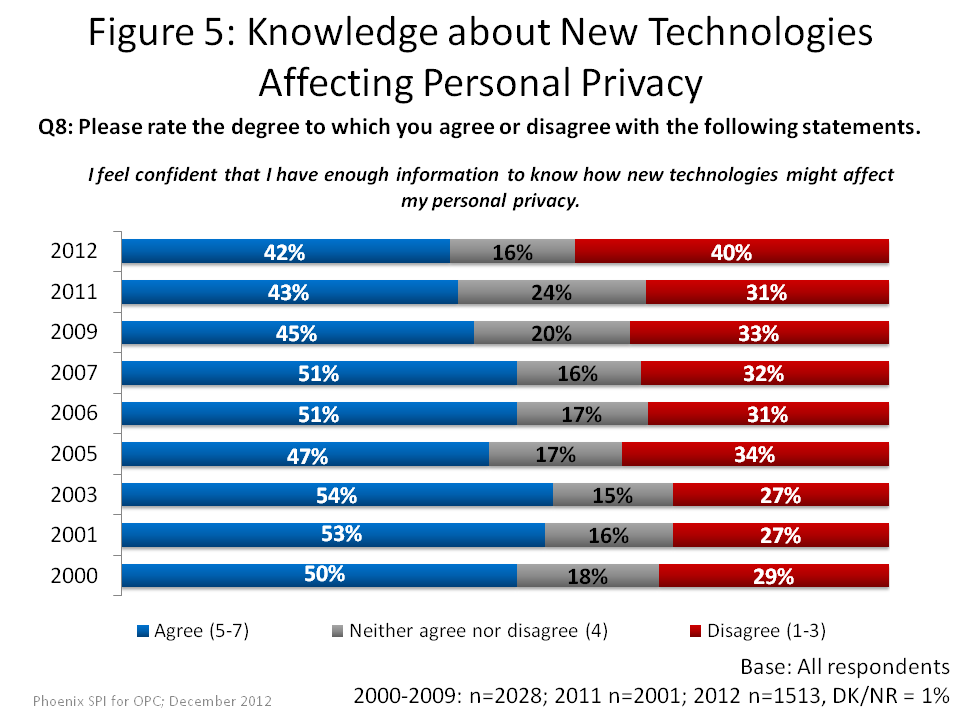
Text version
Figure 5: Knowledge about New Technologies Affecting Personal Privacy
Q8: Please rate the degree to which you agree or disagree with the following statements.
I feel confident that I have enough information to know how new technologies might affect my personal privacy.
| Year | Agree (5-7) | Neither agree nor disagree (4) | Disagree (1-3) |
|---|---|---|---|
| 2000 | 50% | 18% | 29% |
| 2001 | 53% | 16% | 27% |
| 2003 | 54% | 15% | 27% |
| 2005 | 47% | 17% | 34% |
| 2006 | 51% | 17% | 31% |
| 2007 | 51% | 16% | 32% |
| 2009 | 45% | 20% | 33% |
| 2011 | 43% | 24% | 31% |
| 2012 | 42% | 16% | 40% |
Base: All respondents
2000-2009: n=2028; 2011 n=2001; 2012 n=1513, DK/NR = 1%
Canadians 16-24 (31%) compared to those 55+ (21%), Allophones (32%) compared to Francophones (21%), and men (28%) were most apt to strongly feel this way (scores of 6-7). The likelihood of feeling this way increased with perceived knowledge of privacy rights, from 14% of those who claimed to be not knowledgeable to 49% of those who said they are very knowledgeable.
Growing sense of increased importance of protecting privacy in future
Seven in ten Canadians (71%) think that protecting the personal information of Canadians will be one of the most important issues facing our country in the next ten years. This reflects a steady increase since 2009, when 62% agreed.

Text version
Figure 6: Importance of Protection of Personal Information in Next 10 Years
Q8: Please rate the degree to which you agree or disagree with the following statements.
Protecting the personal information of Canadians will be one of the most important issues facing our country in the next 10 years.
| Year | Agree (5-7) | Neither agree nor disagree (4) | Disagree (1-3) |
|---|---|---|---|
| 2009 | 50% | 18% | 29% |
| 2011 | 53% | 16% | 27% |
| 2012 | 54% | 15% | 27% |
Base: All respondents
2009: n=2028; 2011 n=2001; 2012 n=1513, DK/NR = 1%
Canadians 16-24 (31%) compared to those 55+ (21%), Allophones (32%) compared to Francophones (21%), and men (28%) were most apt to strongly feel this way (scores of 6-7). The likelihood of feeling this way increased with perceived knowledge of privacy rights, from 14% of those who claimed to be not knowledgeable to 49% of those who said they are very knowledgeable.
Most Canadians have not sought information about privacy rights
Consistent with previous years, only about one in five Canadians have ever actively sought out information about their privacy rights.
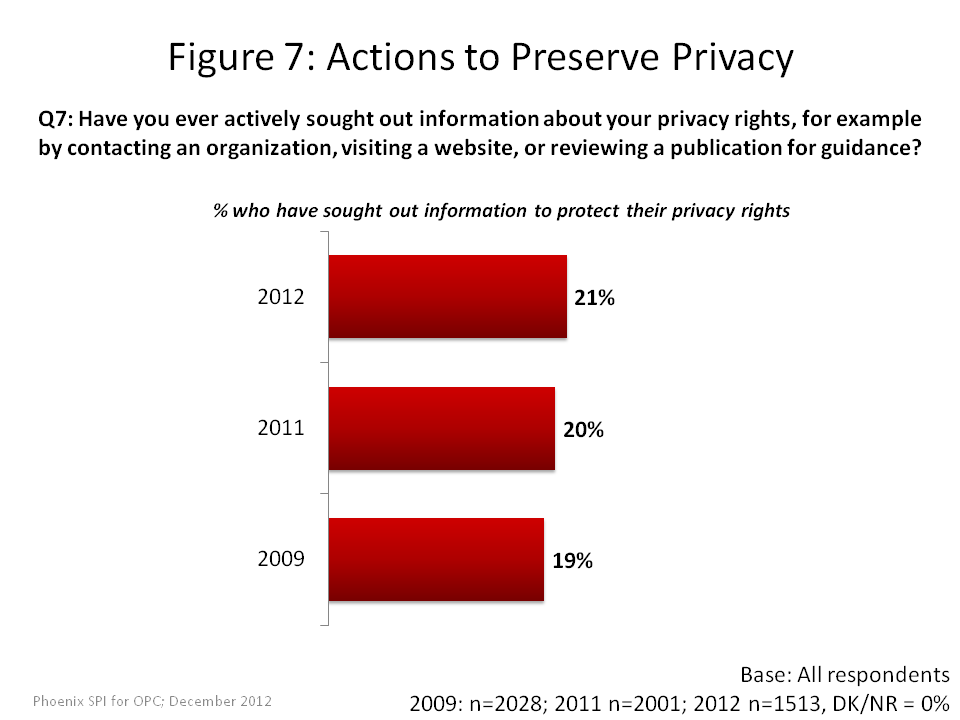
Text version
Figure 7: Actions to Preserve Privacy
Q7: Have you ever actively sought out information about your privacy rights, for example by contacting an organization, visiting a website, or reviewing a publication for guidance?
| Year | % |
|---|---|
| 2009 | 19% |
| 2011 | 20% |
| 2012 | 21% |
Base: All respondents
2009: n=2028; 2011 n=2001; 2012 n=1513, DK/NR = 0%
Concern notwithstanding, Canadians age 55+ were more likely to have not sought information about their privacy rights (84%). The likelihood of having sought information generally increased from east to west, and was higher among Allophones (28% vs. 14% of Francophones and 22% of Anglophones), as well as college (22%) and university (29%) graduates. Canadians who claim they are not knowledgeable about their privacy rights and who are either not at all or not very concerned about the protection of their privacy were more likely to have not sought this type of information.
Canadians reluctant to share personal information with organizations
Most Canadians (57%) say they either never (22%) or rarely (35%) share their personal information with organizations that ask for it. One third say they do so sometimes, while only 10% do so more often.
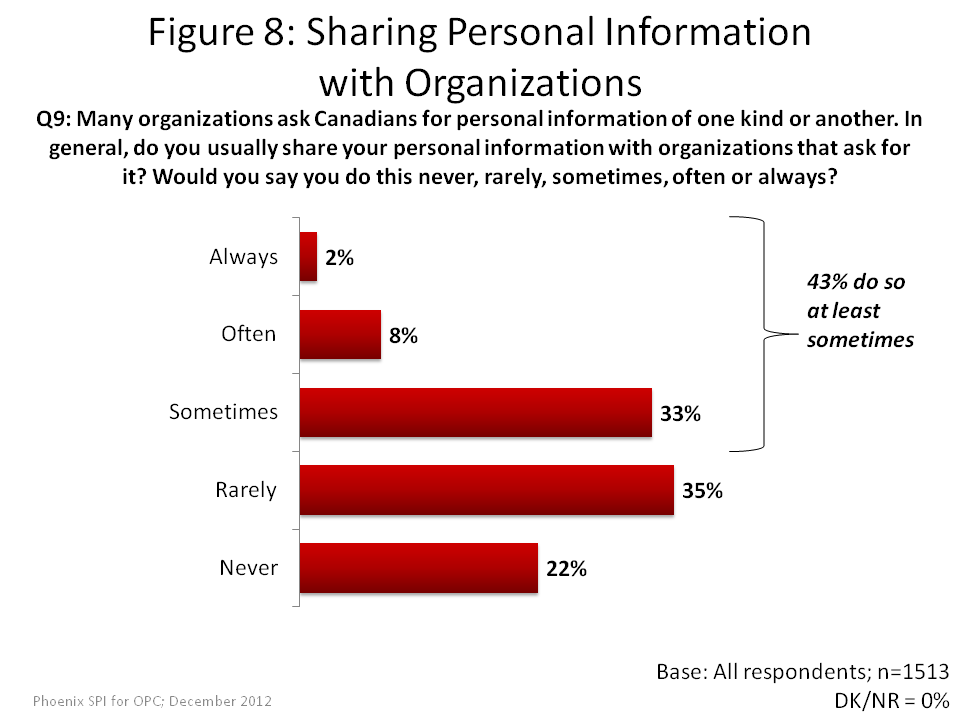
Text version
Figure 8: Sharing Personal Information with Organizations
Q9: Many organizations ask Canadians for personal information of one kind or another. In general, do you usually share your personal information with organizations that ask for it? Would you say you do this never, rarely, sometimes, often or always?
| Sharing Personal Information | % |
|---|---|
| Never | 22% |
| Rarely | 35% |
| Sometimes | 33% |
| Often | 8% |
| Always | 2% |
Base: All respondents; n=1513
DK/NR = 0%
The likelihood of rarely or never sharing personal information generally increased with age, was higher among Atlantic Canadians (65%), and was lower among university graduates (51%) and Allophones (41%). The likelihood of never sharing personal information was higher among the least and most knowledgeable of their privacy rights as well as the least and most concerned about privacy protection.
Most Canadians (60%) have asked an organization that requested personal information from them why they want it or what they will do with it.
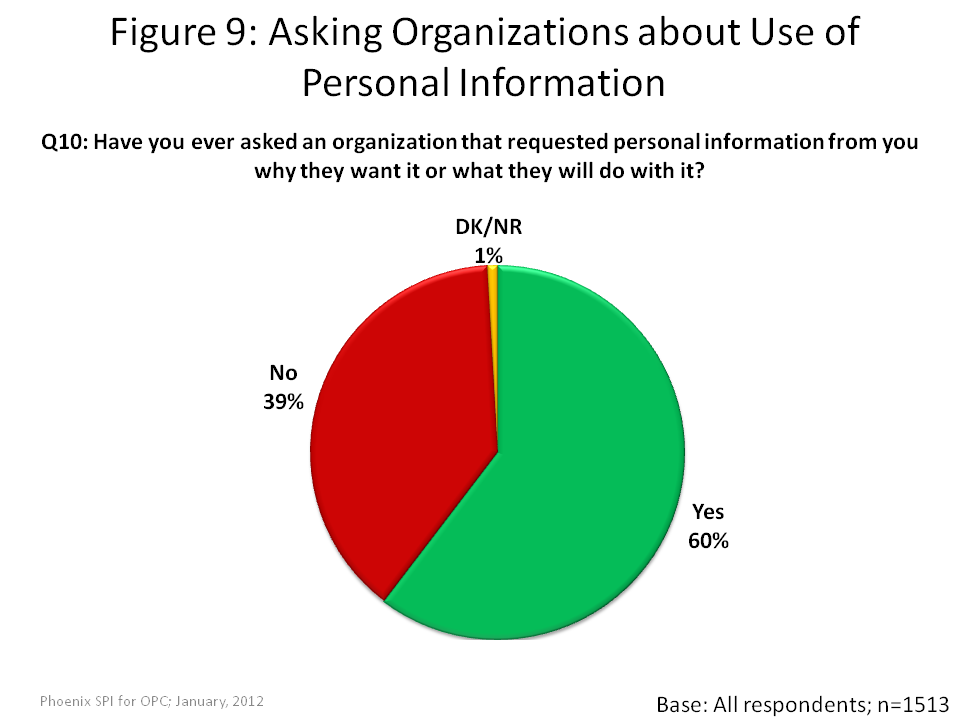
Text version
Figure 9: Asking Organizations about Use of Personal Information
Q10: Have you ever asked an organization that requested personal information from you why they want it or what they will do with it?
| Reasons | Sales |
|---|---|
| Yes | 60% |
| No | 39% |
| DK/NR | 1% |
Base: All respondents; n=1513
Quebeckers (51%), youth (49%), Canadians 55+ (48%), and men (44%) were more likely to report they have never asked an organization about its use of their personal information. Conversely, Anglophones (67%) as well as college (64%) and university (68%) graduates were more apt to have done so. The likelihood of having asked about use of their personal information increased with concern about one’s protection of privacy, from 36% of those least concerned to 67% of those most concerned.
Mixed perceptions of government and business privacy performance
Overall, Canadians offered mixed perceptions of the seriousness that the federal government and businesses apply to their responsibilities to protect personal information. Using a 7-point scale (1 = not seriously at all, 7 = extremely seriously), 64% offered middling scores on the scale (i.e. scores of 3-5) to government. Only 21% think the government takes their privacy-related responsibilities very seriously.
These results have changed little since the last survey. Since 2006, perceptions of how seriously government takes citizen privacy have gradually improved.

Text version
Figure 10: How Serious Government Takes Responsibility to Protect Personal Information
Q12: In your opinion, how seriously does the federal government take their responsibility to protect citizen personal information?
| Year | Seriously (6-7) | Somewhat seriously (3-5) | Not seriously (1-2) |
|---|---|---|---|
| 2006 | 14% | 62% | 20% |
| 2007 | 17% | 64% | 16% |
| 2009 | 16% | 69% | 12% |
| 2011 | 22% | 62% | 11% |
| 2012 | 21% | 64% | 12% |
Base: All respondents; n=1513
Though similar, Canadians’ perceptions of how seriously businesses take their responsibility to protect consumer personal information are somewhat less favorable than for government. That said, over time Canadians are significantly less likely to think that businesses are not taking their privacy responsibilities seriously (34% in 2006 vs. 18% in 2012).
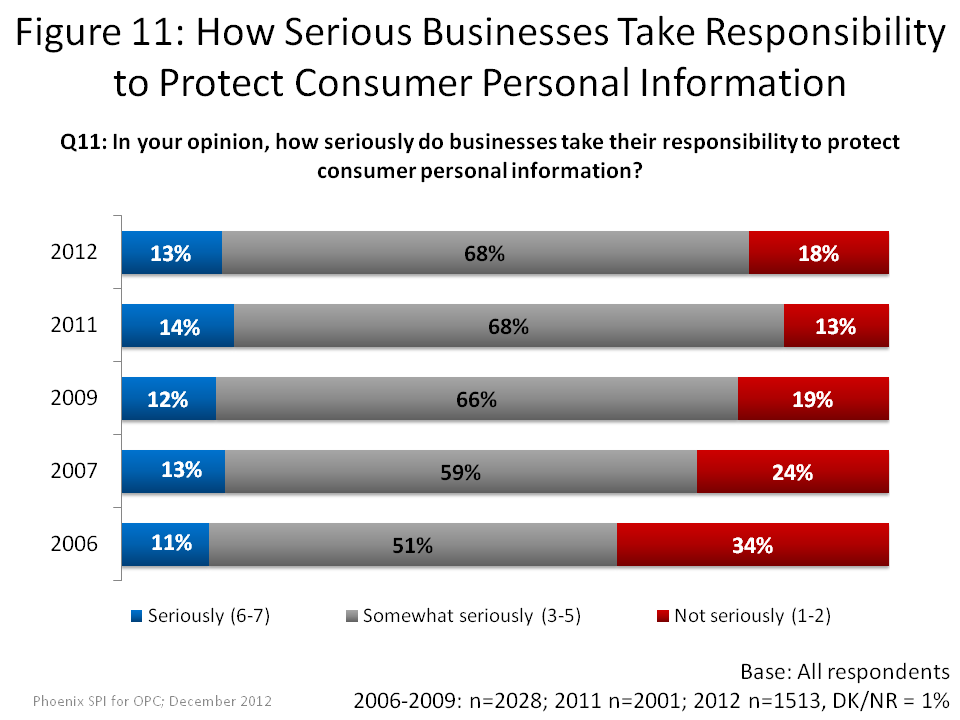
Text version
Figure 11: How Serious Businesses Take Responsibility to Protect Consumer Personal Information
Q11: In your opinion, how seriously do businesses take their responsibility to protect consumer personal information?
| Year | Seriously (6-7) | Somewhat seriously (3-5) | Not seriously (1-2) |
|---|---|---|---|
| 2006 | 11% | 51% | 34% |
| 2007 | 13% | 59% | 24% |
| 2009 | 12% | 66% | 19% |
| 2011 | 14% | 68% | 13% |
| 2012 | 13% | 68% | 18% |
Base: All respondents
2006-2009: n=2028; 2011 n=2001; 2012 n=1513, DK/NR = 1%
Not surprisingly given that 16-24 year olds are more likely to share personal information with organizations and less likely to ask for an explanation regarding its use, youth were most apt to think that businesses and the federal government take their responsibility to protect personal information very seriously: 25% feel this way about businesses (vs. 10-14% of older Canadians) and 32% about the federal government (vs. 16-23%). The likelihood of thinking that businesses and the federal government take privacy seriously increased with perceived knowledge of privacy rights.
Canadians unsure whether organizations would notify them of breach but keenly interested in being notified
Canadians are uncertain whether they would be notified if the personal information they have given an organization were lost, stolen or unintentionally exposed. While a majority (59%) think it is unlikely that an organization would notify them, 41% think they probably would be notified.
Uncertainty in this area aside, virtually all Canadians (97%) say they would want to be notified if the personal information they had given to an organization were compromised.

Text version
Figure 12: Perceived Likelihood of and Desire for Organization Notification of a Breach
Q13: If the personal information you have given to an organization is lost, stolen or unintentionally exposed, do you think that organization would notify you?
| Perceived Likelihood | % |
|---|---|
| Definitely | 7% |
| Probably | 34% |
| Probably not | 45% |
| Definitely not | 14% |
Q14: And if this situation occurred, would you want to be notified?
| Notified | % |
|---|---|
| Definitely | 87% |
| Probably | 10% |
| Probably not | 2% |
| Definitely not | 1% |
Base: All respondents; n=1513
Quebeckers (34%) and those with an apprenticeship or trade certificate (30%) were less likely to think an organization would notify them. Conversely, the likelihood of thinking that they would be notified increased with perceived knowledge of privacy rights, from 36% of the least to 46% of the most knowledgeable. Those least concerned about privacy protection were more apt to think they would be notified of a breach (48% vs. 38-41% of Canadians more concerned about protecting privacy).
Regarding interest in being notified, Allophones were less likely to want to be notified if this occurred—88% vs. 97-99% of respondents who speak English or French most often at home. Similarly, so too were those who claimed to be most knowledgeable of their privacy rights (96% would like to be notified compared to 99% of those least knowledgeable). Canadians most concerned about privacy protection were more apt to want to be notified in the event of a breach (98% vs. 93% of those less concerned).
Relatively low level of awareness of federal privacy institution(s)
Seven in ten Canadians are not aware of any federal institutions that help them with privacy and the protection of personal information from inappropriate collection, use and disclosure.
These results are similar to those of the last few years. Since 2005, however, Canadians’ level of awareness has risen overall.

Text version
Figure 13: Awareness of Federal Institutions
Q1: Are you aware of any federal institutions that help Canadians deal with privacy and the protection of personal information from inappropriate collection, use and disclosure?
| Year | Yes, clearly | Yes, vaguely | No |
|---|---|---|---|
| 2005 | 7% | 13% | 78% |
| 2006 | 8% | 13% | 77% |
| 2007 | 8% | 14% | 77% |
| 2009 | 15% | 18% | 66% |
| 2011 | 11% | 20% | 67% |
| 2012 | 10% | 19% | 70% |
Base: All respondents
2005-2009: n=2028; 2011 n=2001; 2012 n=1513, DK/NR = 1%
Lack of awareness of federal privacy institutions was highest among 16 to 24 year olds (85%), Quebeckers (76%) and Atlantic Canadians (75%). The likelihood of being aware increased with education, from 20% of high school graduates to 40% of university graduates.
Not surprisingly, Canadians who claim they are not knowledgeable about their privacy rights and not concerned about the protection of their privacy were more likely to lack awareness of federal privacy institutions.
Canadians who claimed to be aware of a federal privacy institution were asked which one(s) they had heard of. The OPC was the federal privacy institution identified most often, cited by 15%. An additional 10% cited “an agency” but could not specify its name. In total, 42% could not name any institution.

Text version
Figure 14: Unaided Awareness of Federal Institutions
Q2: Which federal institutions are you aware of?
| Federal Institutions | % |
|---|---|
| OPC | 15% |
| Recall agency, but cannot specify | 10% |
| Privacy legislation | 9% |
| Law enforcement/security agencies | 8% |
| Canada Revenue Agency | 8% |
| Banks (general) | 7% |
| Government health agencies | 5% |
| CRTC | 4% |
| Justice agencies | 4% |
| Consumer protection agencies | 4% |
| Human rights commission(s) | 3% |
| Statistics Canada | 3% |
| Govt. ombudsman | 3% |
| Other | 16% |
| DK/NR | 42% |
Base: Those aware of federal institutions that help Canadians deal with privacy and protection
2012 n=466
In 2012, there was a small decrease in awareness of the OPC, which continues a general trend since 2005. Roughly a quarter of Canadians identified this institution in 2005 and 2006.
Online Information
This section addresses Canadians’ levels of concern about information they post online and how it can be collected and used. Questions in this section (excluding the first one presented below) were asked only of Internet users (n = 1,271).
More than one in ten have been negatively affected by posted information
In total, 12% of Canadians said they have had something posted about them online that has negatively affected their lives in some way. Fully 85% have not.
The likelihood of being affected by online postings increased as age decreased, from 4% of 55+ to 26% of 16-24 year olds.

Text version
Figure 15: Negative Effects of Online Posting
Q15: Has anything posted online about you negatively affected your life in any way? This could be something you posted yourself or someone else posted about you, and could be a picture or words or any other type of online posting.
| Negative Effects | Sales |
|---|---|
| Yes | 12% |
| No | 85% |
| DK/NR | 2% |
Base: All respondents; n=1513
Canadians most concerned about posting location and contact information, least concerned about opinions
Internet users expressed mixed levels of concern about posting a range of information online. The majority are very concerned about posting information about their location and contact information (e.g. name, telephone number, address, email address). They are least concerned about posting their personal opinions about people, issues and things.
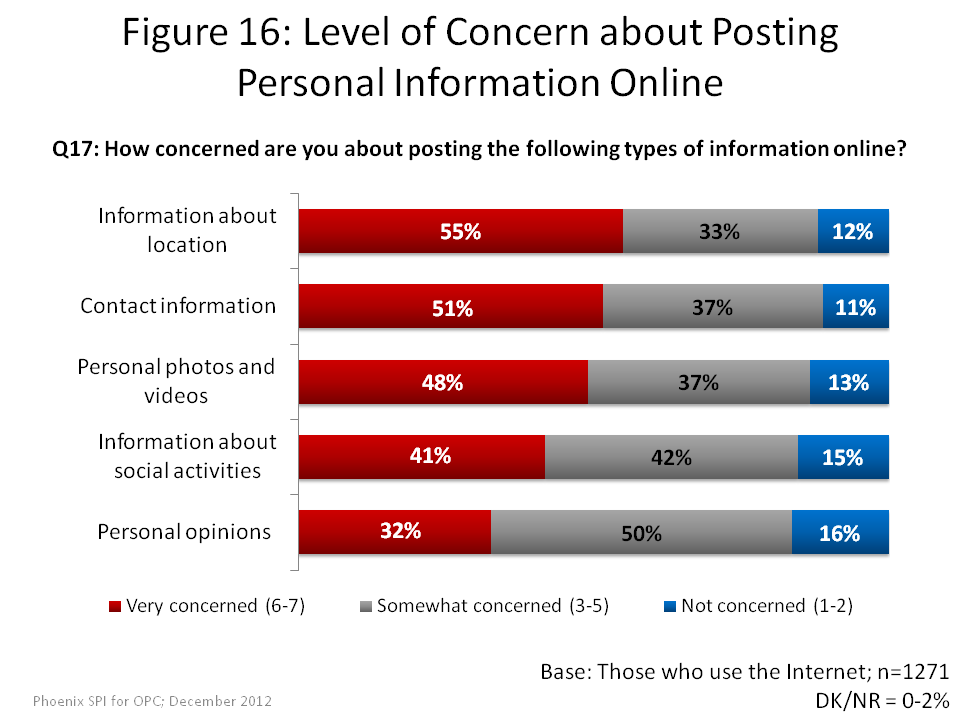
Text version
Figure 16: Level of Concern about Posting Personal Information Online
Q17: How concerned are you about posting the following types of information online?
| Personal Information Online | Seriously (6-7) | Somewhat seriously (3-5) | Not seriously (1-2) |
|---|---|---|---|
| Personal opinions | 32% | 50% | 16% |
| Information about social activities | 41% | 42% | 15% |
| Personal photos and videos | 48% | 37% | 13% |
| Contact information | 51% | 37% | 11% |
| Information about location | 55% | 33% | 12% |
Base: Those who use the Internet; n=1271
DK/NR = 0-2%
Those very knowledgeable about privacy rights, those very concerned about protecting privacy, and women were more apt to express concern (scores of 6-7) with the online posting of all types of personal information. Likewise, with just a few exceptions, concern tended to increase with age. Other differences in perceptions were evident among the subgroups, but none was indicative of a broader pattern.
Two-thirds of Canadians (67%) are concerned about posting at least three of the types of personal information (identified in the previous graph). Thirty-six percent are concerned about all five.

Text version
Figure 17: Breadth of Concern Re: Posting Personal Information Online
Number of Different Types of Personal Information that could be Posted Online that Concern Respondents
| Number of Different Types of Personal Information | % |
|---|---|
| 0 | 11% |
| 1 | 11% |
| 2 | 11% |
| 3-4 | 31% |
| 5 | 36% |
Base: Internet users who provided responses to all items; n=1257
Levels of concern vary depending on how online personal information is used
Internet users expressed at least moderate levels of concern about different ways the information available about them online could be used. Companies using their information to send them spam topped the list, with fully 73% of Internet users expressing strong concern about this. Canadians are least concerned about law enforcement or national security agencies collecting their personal information for use in a specific investigation with a warrant (27% very concerned). However, levels of concern are much higher if these same bodies collect Canadians’ personal information for general surveillance purposes without a warrant (55% very concerned).
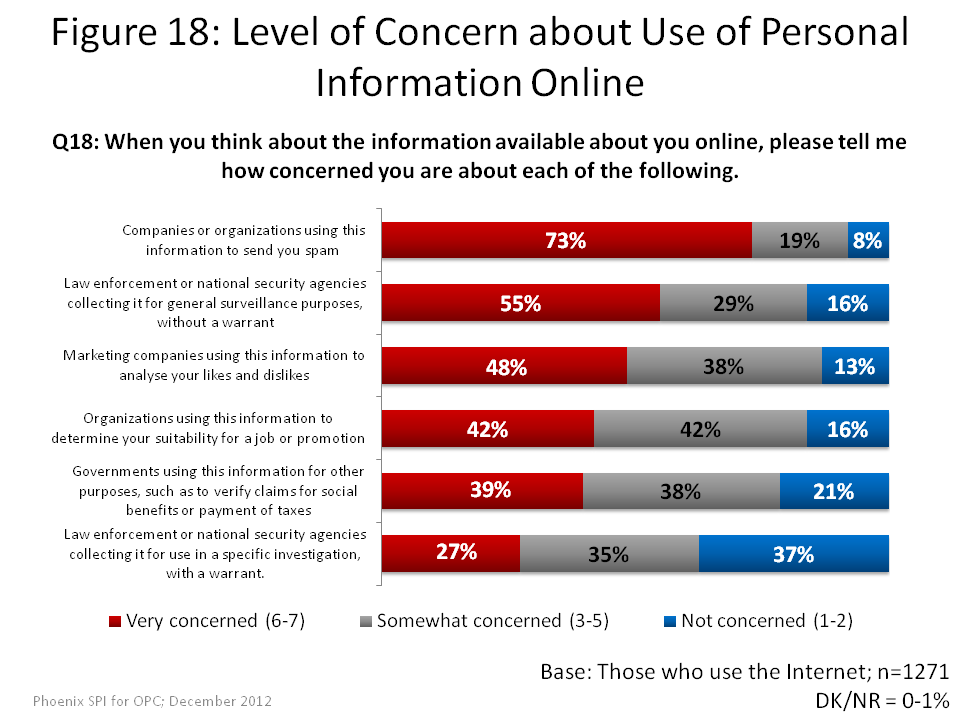
Text version
Figure 18: Level of Concern about Use of Personal Information Online
Q18: When you think about the information available about you online, please tell me how concerned you are about each of the following.
| Use of Personal Information Online | Very concerned (6-7) | Somewhat concerned (3-5) | Not concerned (1-2) |
|---|---|---|---|
| Law enforcement or national security agencies collecting it for use in a specific investigation, with a warrant. | 27% | 35% | 37% |
| Governments using this information for other purposes, such as to verify claims for social benefits or payment of taxes | 39% | 38% | 21% |
| Organizations using this information to determine your suitability for a job or promotion | 42% | 42% | 16% |
| Marketing companies using this information to analyse your likes and dislikes | 48% | 38% | 13% |
| Law enforcement or national security agencies collecting it for general surveillance purposes, without a warrant | 55% | 29% | 16% |
| Companies or organizations using this information to send you spam | 73% | 19% | 8% |
Base: Those who use the Internet; n=1271
DK/NR = 0-1%
In general, concern tended to increase with age and was higher among those who claimed to be very concerned with the protection of privacy. Other differences in perceptions were evident among the subgroups, but none was indicative of a broader pattern.
Looked at another way, most Canadians expressed strong concern (scores of 5-7 on 7-point scale, 1 = not concerned at all, 7 = extremely concerned) for a range of uses of their personal information. Seventy-three percent indicated these high levels of concern for at least three of the uses identified in the previous graph. Conversely, only 5% indicated not being concerned about any.
Behavioural Advertising and Tracking
This section deals with issues of behavioural advertising and the tracking of online activities. Questions in this section were asked only of Internet users (n = 1,271; 84% of all respondents).
Canadians aware of Internet tracking but unlikely to take steps to limit It
Most Canadians are aware that their Internet activities, such as their browsing, searches, purchases, and service interactions, can be tracked by the websites they visit, both commercial and government (73%) and, to a lesser extent, other companies, such as marketers and researchers (63%). If they are aware of one type of tracking, they are more likely to be aware of the other. That said, most (54%) have not taken any steps to limit such tracking.

Text version
Figure 19: Awareness and Behaviour Regarding Internet Tracking
Q19: Were you aware that your Internet activities, such as your browsing, searches, purchases, service interactions, and things like that, can be tracked by.
| Internet Tracking | % |
|---|---|
| The websites you visit, both commercial and government websites | 73% |
| Other companies, such as marketers and researchers | 63% |
Base: Those who use the Internet; n=1271
Q20: It is possible to take action to limit the tracking of your Internet activities. Do you personally take any steps to limit tracking?
| Steps | Sales |
|---|---|
| Yes | 45% |
| No | 54% |
| DK/NR | 1% |
Base: Those who use the Internet; n=1271
Lack of awareness of Internet tracking by websites and other companies was higher among Quebeckers and 16-24 year olds. Conversely, university-educated respondents were more likely to claim to be aware of Internet tracking. As well, 16-24 year olds (70%) and high school graduates (60%) were far more likely to have not taken any steps to limit tracking. Francophones, on the other hand, were more apt to have taken action (53% vs. 34% of Allophones and 44% of Anglophones). The likelihood of taking steps to limit tracking increased with knowledge of privacy rights (from 37% to 51%) and with concern about privacy protection (28% to 49%).
Vast majority think Internet companies should ask permission to track visitors
Showing a clear popular perspective, fully 92% of Canadians said they think that Internet companies should have to ask their permission to track what they do on the Internet.
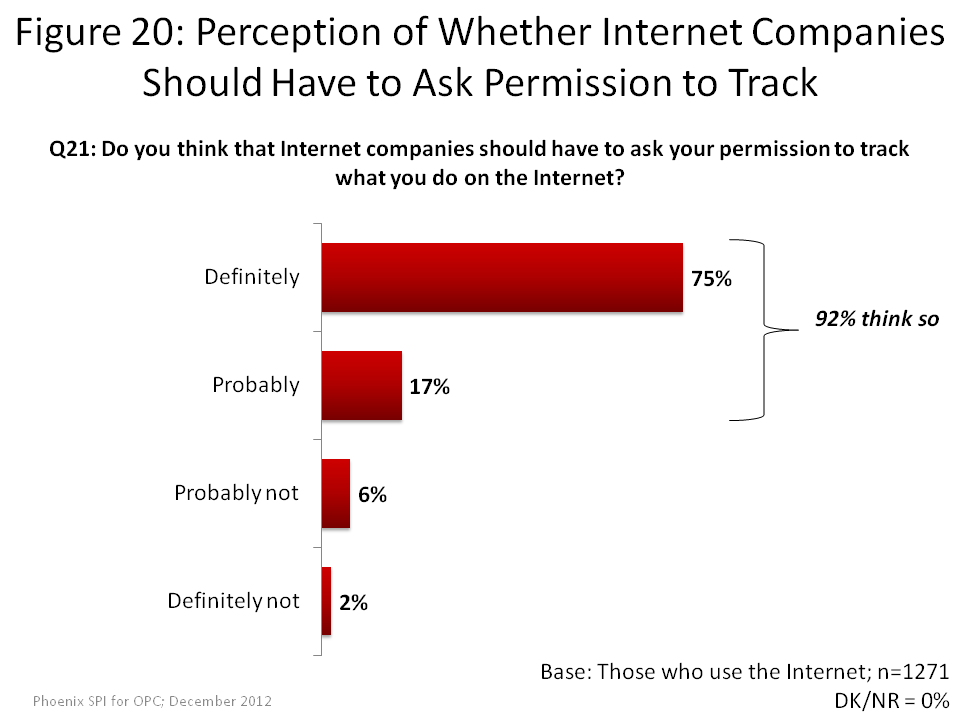
Text version
Figure 20: Perception of Whether Internet Companies Should Have to Ask Permission to Track
Q21: Do you think that Internet companies should have to ask your permission to track what you do on the Internet?
| Ask Permission | % |
|---|---|
| Definitely | 75% |
| Probably | 17% |
| Probably not | 6% |
Base: Those who use the Internet; n=1271
DK/NR = 0%
The likelihood of thinking that companies should definitely have to ask for permission increased with age, from 68% of those under 25 to 78% of 55+, and was higher among Francophones (82% vs. 66% of Allophones and 74% of Anglophones) and those most concerned about their privacy protection (81% vs. 54-73% of those less concerned).
Most Canadians think Internet sites should inform them about privacy issues
A strong majority (81%) of Canadians think it is very important for websites to actively inform them about what kinds of personal information they are collecting and how they use it. Virtually no one attributes low importance to this.
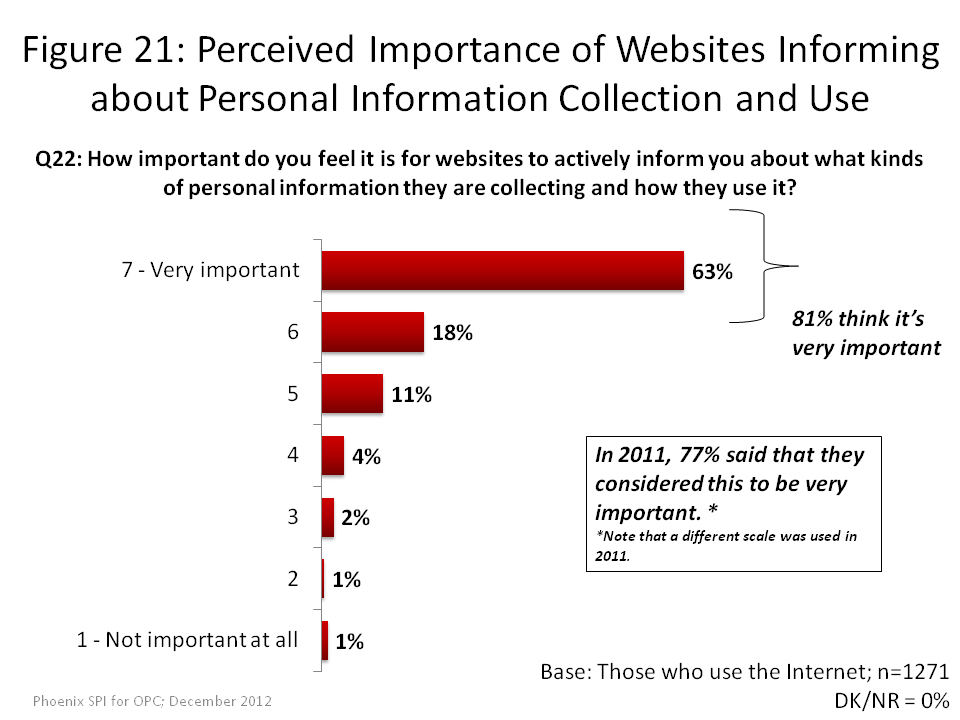
Text version
Figure 21: Perceived Importance of Websites Informing about Personal Information Collection and Use
Q22: How important do you feel it is for websites to actively inform you about what kinds of personal information they are collecting and how they use it?
| Importance | % |
|---|---|
| 1 - Not important at all | 1% |
| 2 | 1% |
| 3 | 2% |
| 4 | 4% |
| 5 | 11% |
| 6 | 18% |
| 7 | 63% |
Base: Those who use the Internet; n=1271
DK/NR = 0%
Canadians concerned about privacy protection (77%), those 55+ (71%), and women (68%) were more likely to find it very important (scores 7) for Internet sites to inform them about privacy issues.
Privacy Policies
This section explores Canadians’ perceptions of privacy policies for Internet sites. Questions in this section were asked only of Internet users (n = 1,271).
Canadians do not consult online privacy policies with much frequency
Despite a strong sense of the importance respondents attribute to websites informing them about the kinds of personal information they collect and how they use it, most Canadians do not consult websites’ privacy policies with much frequency. Fully half do so rarely or never. Conversely, only 21% do this always or often. These results are virtually identical to those of 2011.
Women (25%) and those 55+ (23%) were more apt to say they often or always consult privacy policies. The likelihood of consulting privacy policies often or always increased with perceived knowledge of privacy rights and concern about privacy protection.
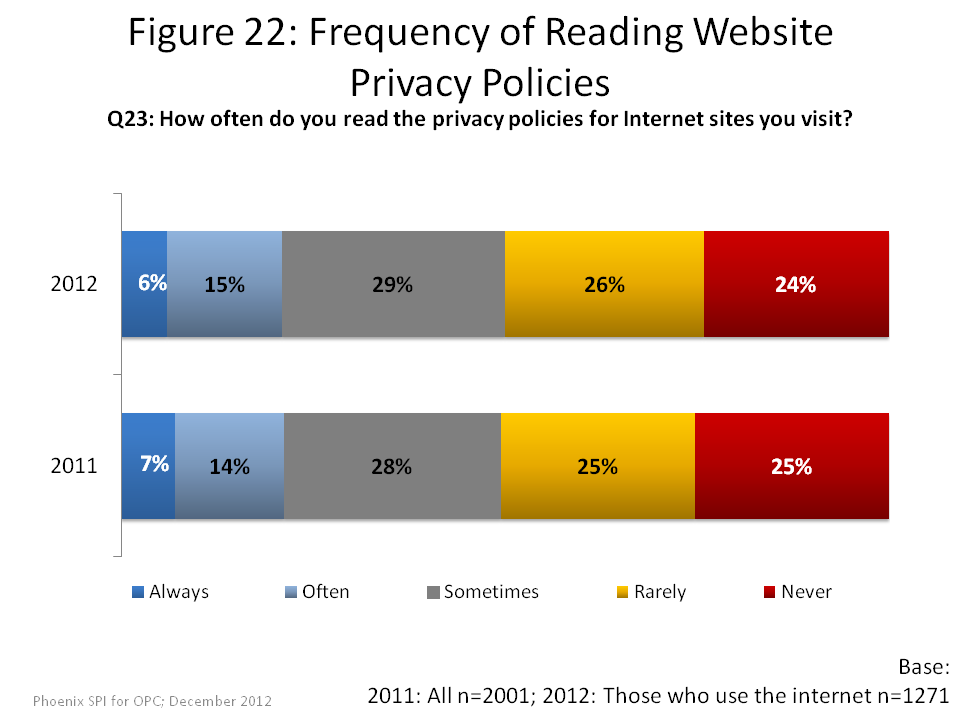
Text version
Figure 22: Frequency of Reading Website Privacy Policies
Q23: How often do you read the privacy policies for Internet sites you visit?
| Year | Always | Often | Sometimes | Rarely | Never |
|---|---|---|---|---|---|
| 2011 | 7% | 14% | 28% | 25% | 25% |
| 2012 | 6% | 15% | 29% | 26% | 24% |
Base:
2011: All n=2001; 2012: Those who use the internet n=1271
Most view privacy policies as vague
Perhaps contributing to this tendency is the perspective amongst most Canadians that websites’ privacy policies are unclear. Sixty-two percent of Canadians feel that the privacy policies of Internet sites they visit are somewhat or very vague in terms of giving them the information about what the company will do with their personal information. This perspective has grown since last year (62% vs. 53%).
Among those who read privacy policies, Allophones (51%), youth (47%), those less concerned about their privacy protection (44%), those knowledgeable about privacy rights (41%), and women (36%) were more likely to find the policies somewhat or very clear.
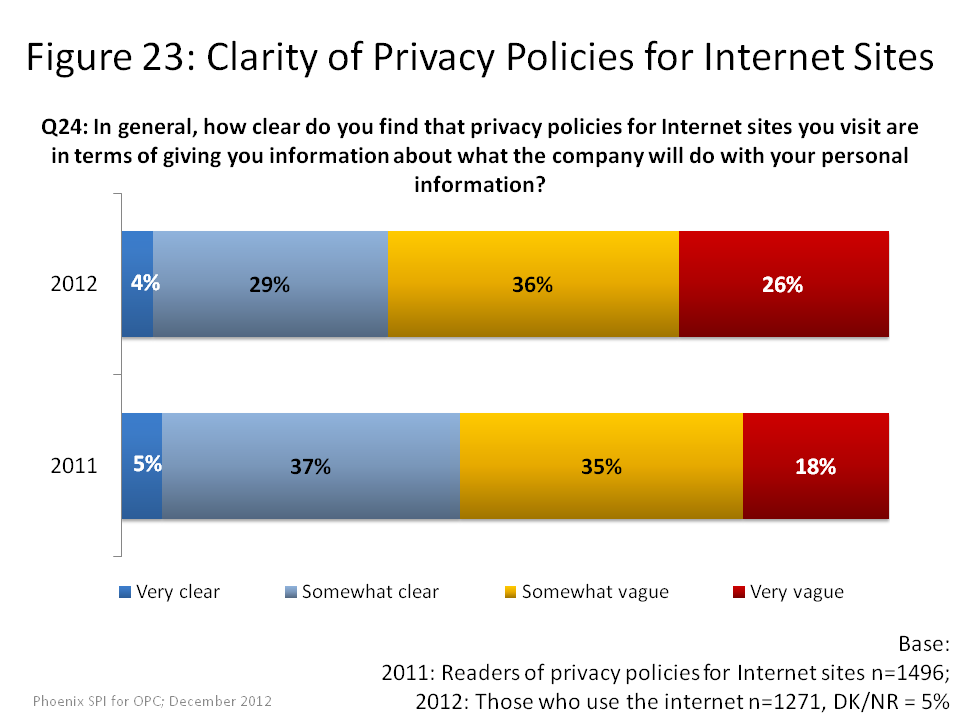
Text version
Figure 23: Clarity of Privacy Policies for Internet Sites
Q24: In general, how clear do you find that privacy policies for Internet sites you visit are in terms of giving you information about what the company will do with your personal information?
| Year | Very clear | Somewhat clear | Somewhat vague | Very vague |
|---|---|---|---|---|
| 2011 | 5% | 37% | 35% | 18% |
| 2012 | 4% | 29% | 36% | 26% |
Base:
2011: Readers of privacy policies for Internet sites n=1496; 2012: Those who use the internet n=1271, DK/NR = 5%
Over two-thirds avoid sites or services if uncomfortable with privacy terms
Sixty-eight percent of Canadians have chosen not to use a site or a service because they were uncomfortable with the terms that were set out in the privacy policy.
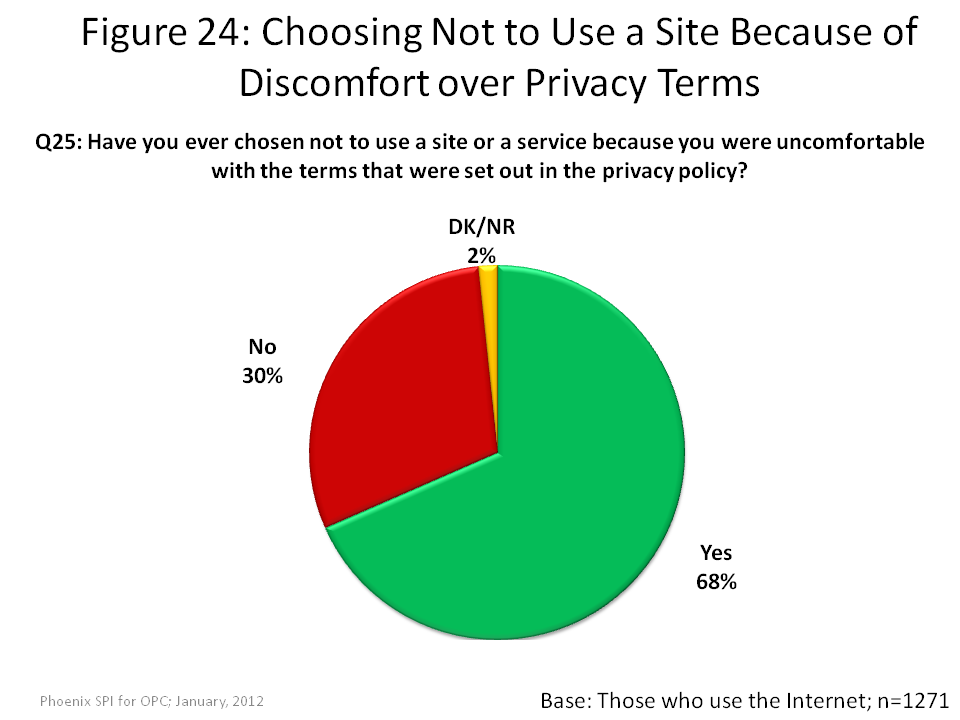
Text version
Figure 24: Choosing Not to Use a Site Because of Discomfort over Privacy Terms
Q25: Have you ever chosen not to use a site or a service because you were uncomfortable with the terms that were set out in the privacy policy?
| Discomfort | Sales |
|---|---|
| Yes | 68% |
| No | 30% |
| DK/NR | 2% |
Base: Those who use the Internet; n=1271
The likelihood of avoiding sites or services was higher among those very concerned about the protection of their privacy (78%), women (72%) and university-educated respondents (72%).
Mobile Devices
This section explores Canadians’ use of mobile devices in relation to privacy issues. Questions in this section were asked of those who use a mobile device (n = 1,089).
Mobile users increasingly likely to use privacy protection measures
Three-quarters of Canadians use mobile devices, such as cell phones, smart phones, or tablets. The majority of these people are likely to use a password to lock it (56%) and to adjust settings of the device or apps to limit the amount of personal information they share with others (53%). These findings reflect an increase in the use of such measures since 2011.
Mobile users are also increasingly likely to download applications for the device (56% vs. 28% in 2011) and to store personal information on it (47% vs. 30%).
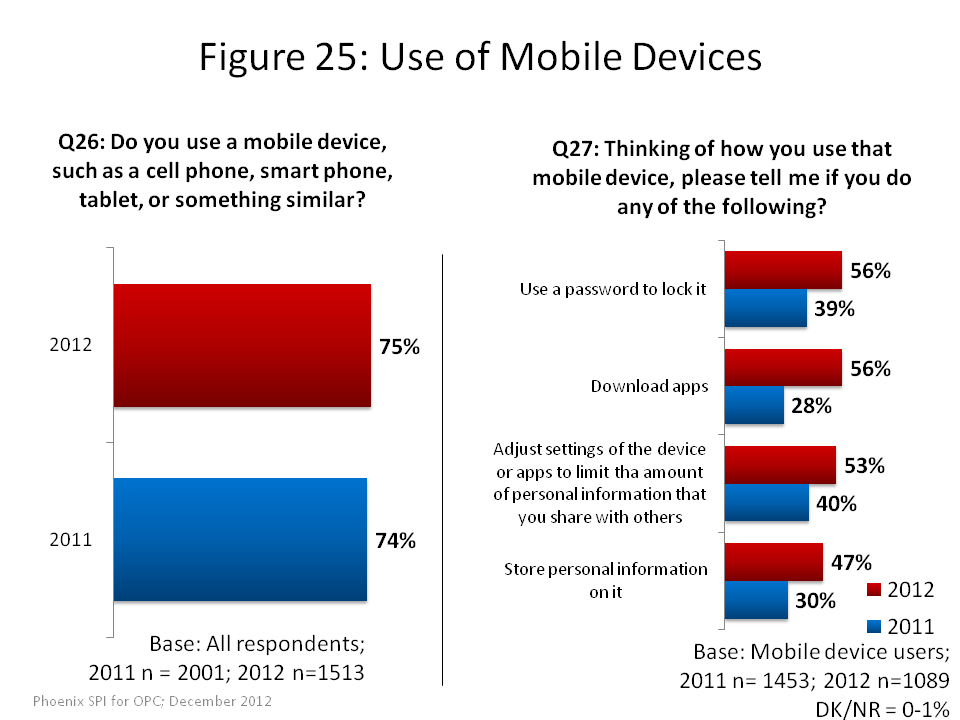
Text version
Figure 25: Use of Mobile Devices
Q26: Do you use a mobile device, such as a cell phone, smart phone, tablet, or something similar?
| Year | % |
|---|---|
| 2012 | 75% |
| 2011 | 74% |
Base: Mobile device users;
2011 n= 1453; 2012 n=1089
DK/NR = 0-1%
Q27: Thinking of how you use that mobile device, please tell me if you do any of the following?
| Features | 2012 | 2011 |
|---|---|---|
| Use a password to lock it | 56% | 39% |
| Download apps | 56% | 28% |
| Adjust settings of the device or apps to limit tha amount of personal information that you share with others | 53% | 40% |
| Store personal information on it | 47% | 30% |
Base: Mobile device users;
2011 n= 1453; 2012 n=1089
DK/NR = 0-1%
Use of mobile devices increased as age decreased, from 60% of those 55+ to 92% of 16-24 year olds. Use was higher among men (78% vs. 73% of women) and those somewhat (77%) or very (76%) concerned about the protection of their privacy. The likelihood of engaging in these activities generally increased as age decreased. This was the most consistent and strongest pattern evident among the subgroups.
In terms of the breadth of activities mobile users are engaging in with their devices, most have done at least one of the activities cited in the previous graph. That said, nearly a quarter (23%) have done none.

Text version
Figure 26: Number of Different Actions Taken to Protect Privacy When Using Mobile Devices
% who indicated taking a given number of actions identified to protect their privacy with their mobile devices
| Number of Actions | % |
|---|---|
| 0 | 23% |
| 1 | 16% |
| 2 | 20% |
| 3 | 24% |
| 4 | 17% |
Base: Mobile device users who responded to all items; n=1067
Most avoid an app if they have privacy concerns but unlikely to turn off location tracking
The majority of mobile users (55%) have decided not to install, or have uninstalled, an app because of the amount of personal information they would have to provide. A smaller proportion (38%) have turned off the location tracking feature on their mobile device because they were concerned about others accessing that information. Recall that Canadians are more concerned about posting location information online than they are about any of the other types of information explored - 55% expressed strong concern about posting location information online.

Text version
Figure 27: Avoiding an App or Turning off Location Tracking Because of Privacy Concerns
Q28: Have you ever decided not to install, or uninstalled, an app because of the amount of personal information you would have to provide?
| Not to install, or uninstalled | Sales |
|---|---|
| Yes | 55% |
| No | 42% |
| DK/NR | 3% |
Q29: Have you ever turned off the location tracking feature on your mobile device because you were concerned about others accessing that information?
| Turned off the location tracking feature | Sales |
|---|---|
| Yes | 38% |
| No | 60% |
| DK/NR | 2% |
Base: Mobile device users; n=1089
Focusing on risk groups, respondents with a trades-related education (52%), those 55+ (51%), high school graduates, those less knowledgeable about their privacy rights as well as less concerned about protecting these rights (50% each), and Quebeckers (49%) were more likely to have not avoided an app.
The likelihood of not turning off the location tracker increased with age (from 48% of 16-24 year olds to 72% of those 55+) and was higher among Quebeckers (67%). Conversely, Allophones (51%), university-educated respondents (45%), and those very concerned about privacy protection (40%) were more apt to have turned off this feature because of their concerns.
Strong minority think information on mobile devices less private
While half of mobile users think the information stored on their mobile device is about as private as the information stored on their home computer, almost one-third (32%) think that it is less private. Interestingly, 13% think such information is more private on their mobile device.
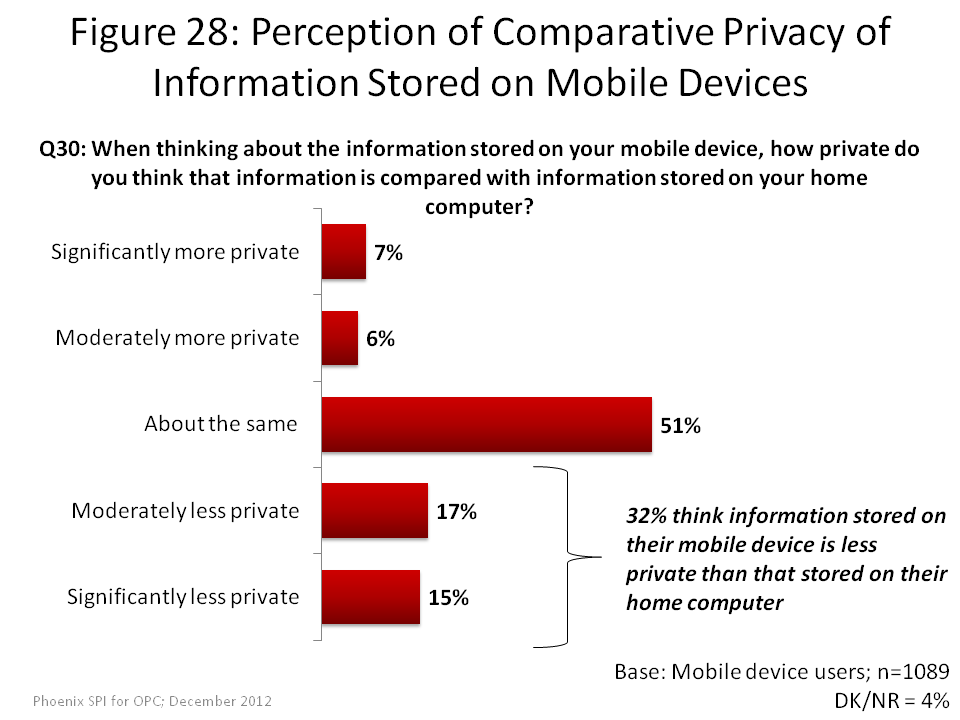
Text version
Figure 28: Perception of Comparative Privacy of Information Stored on Mobile Devices
Q30: When thinking about the information stored on your mobile device, how private do you think that information is compared with information stored on your home computer?
| Perception of Privacy | % |
|---|---|
| Significantly more private | 7% |
| Moderately more private | 6% |
| About the same | 51% |
| Moderately less private | 17% |
| Significantly less private | 15% |
Base: Mobile device users; n=1089
DK/NR = 4%
The likelihood of thinking that information is less private on a mobile device was higher among those from Quebec and British Columbia (38% each compared to the Prairies at 26%) and among university graduates (37% vs. college and high school graduates at 28% and 29% respectively).
National Security and Public Safety
This section presents Canadians’ feedback on privacy issues related to national security and public safety. Questions in this section were asked of all respondents.
Divided levels of comfort with telecom companies being required to disclose information to police and security agencies without a warrant
When asked how comfortable they are with police and intelligence agencies being able to require telecommunications companies to disclose various types of subscriber information without a warrant, Canadians were divided. And, in general, this orientation did not vary much based on the type of information that would be disclosed by the telecommunications companies. They are most likely to be comfortable with telecoms releasing names and phone numbers (30-31% are very comfortable with this), followed closely by their address, email address and IP address (27-29%). Nevertheless, the proportion of Canadians who expressed a clear lack of comfort with respect to each of these items is significant, ranging from 39-44%.
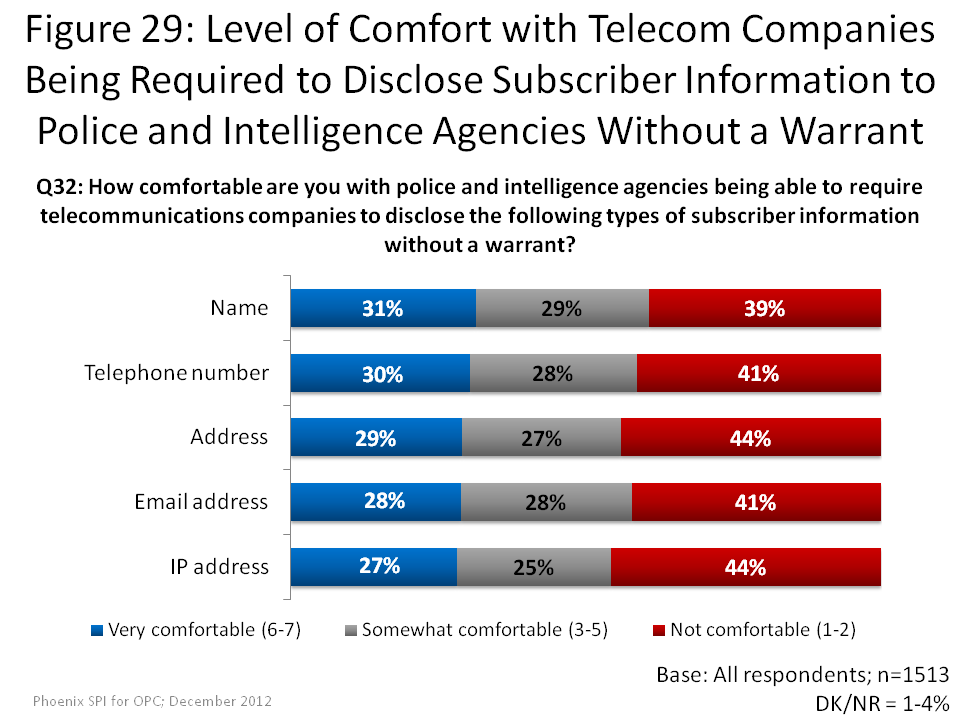
Text version
Figure 29: Level of Comfort with Telecom Companies Being Required to Disclose Subscriber Information to Police and Intelligence Agencies Without a Warrant
Q32: How comfortable are you with police and intelligence agencies being able to require telecommunications companies to disclose the following types of subscriber information without a warrant?
| Types of information | Very comfortable (6-7) | Somewhat comfortable (3-5) | Not comfortable (1-2) |
|---|---|---|---|
| IP address | 27% | 25% | 44% |
| Email address | 28% | 28% | 41% |
| Address | 29% | 27% | 44% |
| Telephone number | 30% | 28% | 41% |
| Name | 31% | 29% | 39% |
Base: All respondents; n=1513
DK/NR = 1-4%
The likelihood of being not at all comfortable with the disclosure of these types of subscriber information increased with age, and was consistently higher among those who perceived themselves to be more knowledgeable about privacy rights and more concerned about privacy protection.
Of those who responded, most indicated being relatively comfortable (scores of 5-7 on 7-point scale) with at least one of the types of information listed in the previous graph being released without a warrant. Twenty-eight percent are comfortable with all types of information being released, while 46% were comfortable with none of it being released.

Text version
Figure 30: Extent of Comfort Re: Telecos Disclosing Subscriber Information
Number of Different Types of Subscriber Information Respondents would be Comfortable with Telecos being Compelled to Disclose Without a Warrant
| Number of Types of Information | % |
|---|---|
| 0 | 46% |
| 1 | 9% |
| 2 | 5% |
| 3-4 | 12% |
| 5 | 28% |
Base: All respondents who responded to all items; n=1409
Level of comfort with disclosure of personal information for various purposes
Survey respondents were asked about their level of comfort with law enforcement agencies being able to require organizations to disclose personal information, without a warrant, for a variety of purposes. Canadians are most likely to be comfortable with law enforcement agencies obtaining this information in order to locate vulnerable persons – both young persons who have run away and persons who may be a danger to themselves or others. In total, 63% and 58% respectively said they were very comfortable with this (scores of 6-7 on 7-point scale).
Canadians are least likely to be comfortable with such information being disclosed as evidence for an investigation into a minor infraction (24%), in sharp contrast to personal information being disclosed for an investigation into a serious offence (49%). Comfort levels were also relatively low for law enforcement agencies wanting to gather information about a person’s online activities (25%).
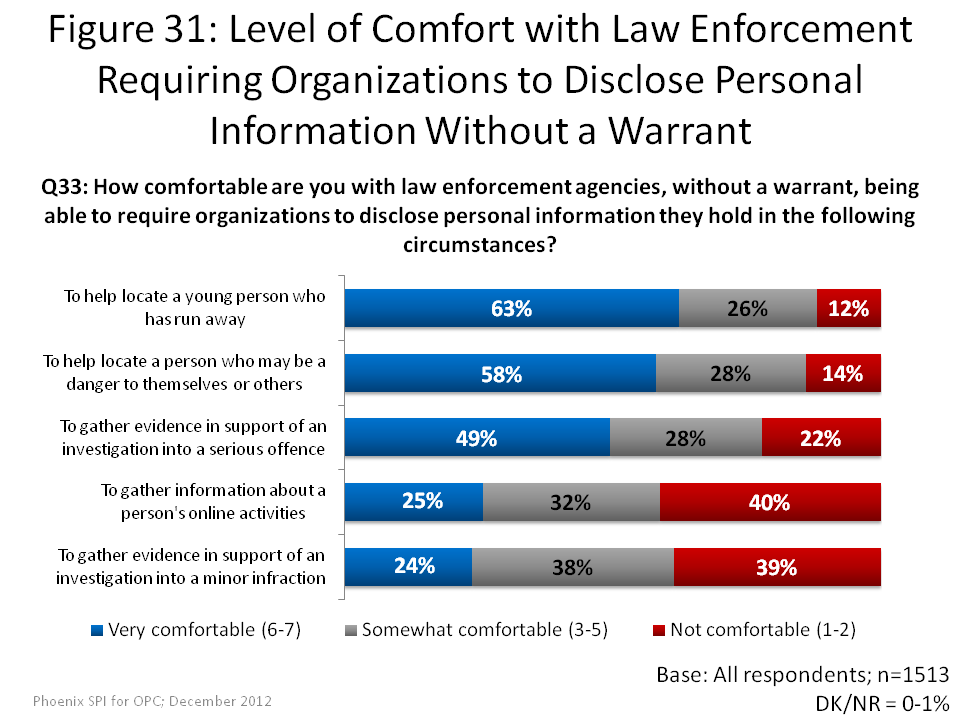
Text version
Figure 31: Level of Comfort with Law Enforcement Requiring Organizations to Disclose Personal Information Without a Warrant
Q33: How comfortable are you with law enforcement agencies, without a warrant, being able to require organizations to disclose personal information they hold in the following circumstances?
| Circumstances | Very comfortable (6-7) | Somewhat comfortable (3-5) | Not comfortable (1-2) |
|---|---|---|---|
| To gather evidence in support of an investigation into a minor infraction | 24% | 38% | 39% |
| To gather information about a person's online activities | 25% | 32% | 40% |
| To gather evidence in support of an investigation into a serious offence | 49% | 28% | 22% |
| To help locate a person who may be a danger to themselves or others | 58% | 28% | 14% |
| To help locate a young person who has run away | 63% | 26% | 12% |
Base: All respondents; n=1513
DK/NR = 0-1%
Women are more likely to be comfortable with the disclosure of personal information in all of these situations. Conversely, in most of these situations, compared to older Canadians, 16-24 year olds were less likely to say they are comfortable with law enforcement compelling organizations to disclose personal information.
In terms of the breadth of purposes for requiring organizations to disclose personal information without a warrant, most Canadians (63%) were comfortable with at least three of the purposes identified in the previous graph. Roughly one-quarter (26%) was comfortable with all five.
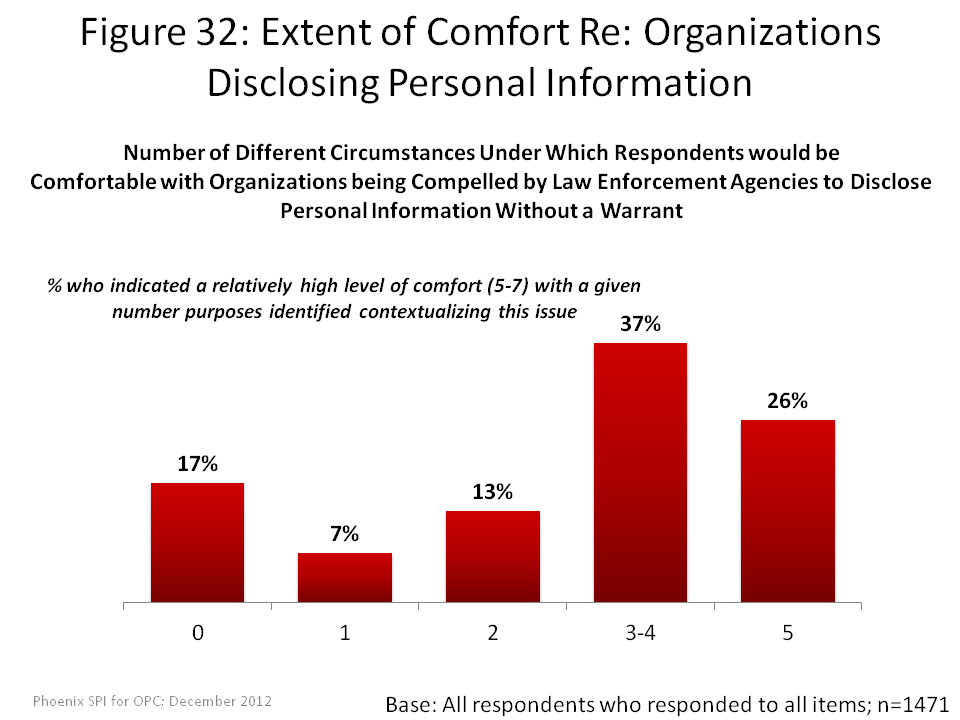
Text version
Figure 32: Extent of Comfort Re: Organizations Disclosing Personal Information
Number of Different Circumstances Under Which Respondents would be Comfortable with Organizations being Compelled by Law Enforcement Agencies to Disclose Personal Information Without a Warrant
| Number of Different Circumstances | % |
|---|---|
| 0 | 17% |
| 1 | 7% |
| 2 | 13% |
| 3-4 | 37% |
| 5 | 26% |
Base: All respondents who responded to all items; n=1471
Unmanned Aerial Vehicles
This section presents Canadians’ perceptions of the use of unmanned aerial vehicles (UAVs).
Strong levels of comfort with some uses of UAVs, less for public surveillance
Most Canadians are very comfortable with the use of unmanned aerial vehicles to help with search and rescue missions (81%), to patrol the border (66%), and for law enforcement investigations (54%). This is the proportion of respondents who offered high scores of 6 or 7 on a 7-point scale. They are less comfortable with use of UAVs for more generally monitoring the public, such as at events or protests (42%), or for general surveillance of public spaces (35%). Note that for uses related to public monitoring, one in five or more (19-24%) said they were not really comfortable with this at all.

Text version
Figure 33: Level of Comfort with Unmanned Aerial Vehicles
Q34: How comfortable are you with the use of UAVs in Canada for the following types of activities?
| Types of activities | Very comfortable (6-7) | Somewhat comfortable (3-5) | Not comfortable (1-2) |
|---|---|---|---|
| To conduct general surveillance over public spaces | 35% | 39% | 24% |
| To monitor an event or a protest | 42% | 40% | 19% |
| For law enforcement investigations | 54% | 35% | 11% |
| To patrol the border | 66% | 26% | 8% |
| To help with search and rescue missions | 81% | 16% | 3% |
Base: All respondents; n=1513
DK/NR = 0-1%
Compared to respondents who speak English or French most often at home, Allophones were less likely to be comfortable with most of the potential uses of UAVs. Similarly, Canadians under 35 years were less apt to be comfortable with all of these uses of UAVs. Canadians less concerned about the protection of their privacy tended to be more comfortable with the various uses of UAVs in Canada.
Nearly three-quarters of Canadians (74%) are quite comfortable with at least three of these uses for UAVs (rating it between 5 and 7 on a 7-point scale). A significant minority (43%) are relatively comfortable with all five.

Text version
Figure 34: Extent of Comfort with Unmanned Aerial Vehicles
Number of Different Ways Unmanned Aerial Vehicles Could be Used with which Respondents are Comfortable
| Number of Different Ways | % |
|---|---|
| 0 | 5% |
| 1 | 8% |
| 2 | 13% |
| 3-4 | 31% |
| 5 | 43% |
Base: All respondents who responded to all items; n=1470
Genetic Privacy
This section deals with issues of genetic testing and privacy.
Significant concern about disclosure of genetic tests for non-health reasons
Fifty-two percent of surveyed Canadians expressed strong concern that, if their doctor recommended that they undergo genetic testing, they might be asked to provide the results for non-health related purposes, such as when trying to obtain insurance or applying for a job. Most others indicated moderate levels of concern.

Text version
Figure 35: Level of Concern with Genetic Testing Affecting Non-Health Related Purposes
Q35: If your doctor recommended that you undergo genetic testing, how concerned would you be that you might be asked to provide the results for non-health related purposes, such as when trying to obtain insurance or applying for a job?
| % | |
|---|---|
| 1 - Not concerned at all | 11% |
| 2 | 4% |
| 3 | 5% |
| 4 | 10% |
| 5 | 16% |
| 6 | 11% |
| 7 - Extremely concerned | 41% |
Base: All respondents; n=1513
DK/NR = 1%
The following were more likely to be very concerned (scores of 6-7) about genetic testing:
- University (62%) and college (57%) graduates
- Those most concerned about the protection of privacy (62%)
- Anglophones (54%) and Francophones (52%) compared to Allophones (37%)
- 35-54 year olds (60%) and 55+ (52%)
In total, 71% of those who expressed significant concern (scores of 5-7 on 7-point scale) said that their concerns would likely affect their willingness to undergo genetic testing. More than half of these, 43%, said that this was definitely the case.
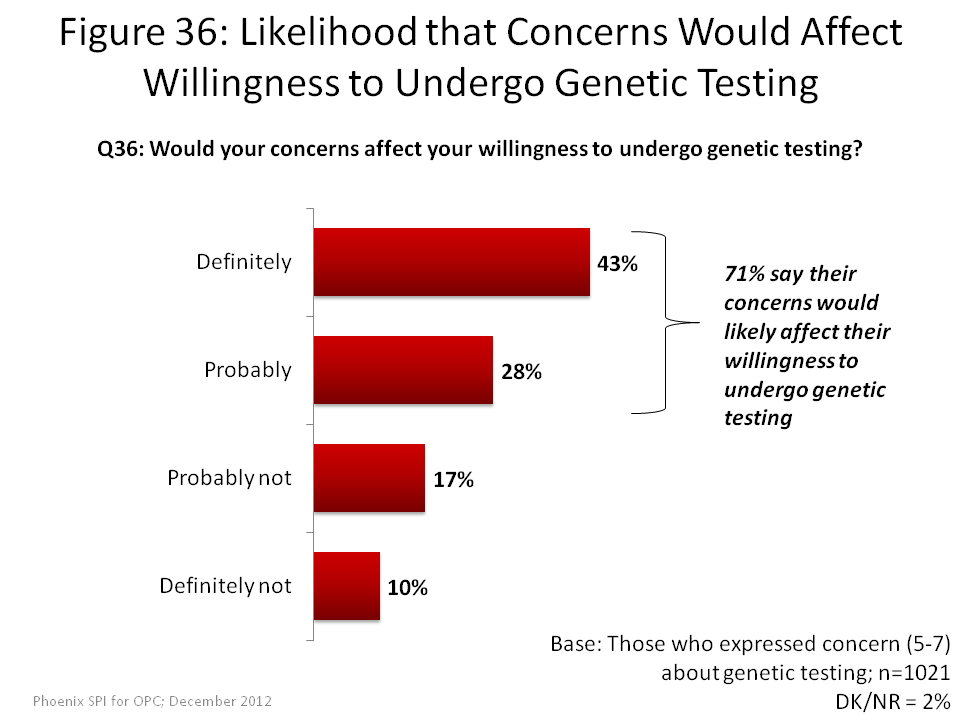
Text version
Figure 36: Likelihood that Concerns Would Affect Willingness to Undergo Genetic Testing
Q36: Would your concerns affect your willingness to undergo genetic testing?
| % | |
|---|---|
| Definitely | 43% |
| Probably | 28% |
| Probably not | 17% |
| Definitely not | 10% |
Base: Those who expressed concern (5-7) about genetic testing; n=1021
DK/NR = 2%
Among those who expressed concern about genetic testing, 25-34 year olds were the most apt to say their concerns would affect their willingness to undergo testing (82% vs. 66-72% of other Canadians).
Characteristics of Survey Participants
The following table presents the characteristics of survey participants.
| Characteristics of Survey Respondents | |
|---|---|
| Age | |
| Total | |
| Base(N) | 1513 |
| 16-24 | 14% |
| 25-34 | 15% |
| 35-54 | 34% |
| 55+ | 32% |
| Refused | 6% |
| Education | |
| Total | |
| Base(N) | 1513 |
| High school diploma or equivalent | 24% |
| Registered apprenticeship or other trades certificate or diploma | 9% |
| College, CEGEP or other non-university certificate or diploma | 24% |
| University degree, certificate or diploma | 36% |
| None | 6% |
| Refused | 1% |
| Language | |
| Total | |
| Base(N) | 1513 |
| English | 70% |
| French | 21% |
| Other | 8% |
| Gender | |
| Total | |
| Base(N) | 1513 |
| Male | 48% |
| Female | 52% |
| Cell Phone Participants Household Telephone Use | |
| Total | |
| Base(N) | 300 |
| Cell-phone only | 45% |
| Also have a landline | 54% |
| DK/NR | 1% |
| Landline Participants Household Telephone Use | |
| Total | |
| Base(N) | 300 |
| Landline only | 30% |
| Also have a cell phone | 69% |
| DK/NR | 1% |
Appendix
Questionnaire
Office of the Privacy Commissioner
2012 Survey of Canadians
Hello, my name is ________. I’m calling on behalf of Phoenix, a public opinion research company. We’re conducting a survey for the Government of Canada to explore issues of interest to Canadians. The survey should take only 15 minutes to complete. Participation is voluntary and your answers will remain anonymous.
CELL SAMPLE SKIP A, GO TO CS1
-
I’d like to speak to someone in your household who is 16 years of age or older. Is that you?
- Yes CONTINUE
- No ASK TO SPEAK TO ELIGIBLE PERSON. REPEAT INTRO
- Refused (VOLUNTEERED) THANK/DISCONTINUE
CELL SAMPLE ONLY:
CS1. Have I reached you on your cell phone?
- Yes CONTINUE
- No GO TO B
CS2. Are you 16 years of age or older?
- Yes CONTINUE
- No THANK/DISCONTINUE
CS3. Are you in a place where you can safely talk on the phone and answer my questions?
- Yes GO TO B
- No CONTINUE
CS4. When would it be more convenient for me to call back?
Schedule call-back if possible (time/day): _______________
- B. Do you, or does anyone in your family or household, work in any of the following areas? [READ LIST]
- Advertising or Market Research THANK/DISCONTINUE
- The media (i.e. TV, radio, newspapers) THANK/DISCONTINUE
- An elected official THANK/DISCONTINUE
* THOSE WHO ARE NOT ELIGIBLE: Thank you for your willingness to take part in this survey, but you do not meet the eligibility requirements of this study.
INTERVIEWER AND PROGRAMMING NOTES:
RESEARCH VALIDITY: IF RESPONDENT QUESTIONS THE VALIDITY OF THE RESEARCH, INVITE RESPONDENT TO CALL THE NATIONAL SURVEY REGISTRATION SYSTEM (SEE NOTE BELOW)
SURVEY REGISTRATION SYSTEM: IF RELEVANT, INFORM RESPONDENT ABOUT NATIONAL SURVEY REGISTRATION SYSTEM:
The registration system has been created by the survey research industry to allow the public to verify that a survey is legitimate, get information about the survey industry or register a complaint. The registration system’s toll-free phone number is 1-888-602-6742 EXT. 8728. (WWW.MRIA-ARIM.CA)
IF ASKED ABOUT THE NATIONAL DO NOT CALL LIST: Calls made for the purpose of market research, polls or surveys are not considered telemarketing calls. Organizations making these types of calls are not required to register with the National Do Not Call List. The National Do Not Call List toll-free telephone number is 1-866-580-3625
SECTION HEADINGS SHOULD NOT BE READ TO RESPONDENTS.
REVEAL THE NAME OF THE CLIENT AGENCY THAT COMMISSIONED THE SURVEY AT THE END OF THE SURVEY, IF ASKED – THE OFFICE OF THE PRIVACY COMMISSIONER.
UNLESS OTHERWISE SPECIFIED, ALL QUESTIONS IN THE SURVEY WILL ALLOW FOR ‘DON’T KNOW/NO RESPONSE’ OPTION.
TRACKING QUESTIONS ARE IDENTIFIED AS FOLLOWS: T11 = QUESTION ASKED IN 2011.
General Awareness and Perceptions
Many of the questions in this survey are about personal privacy and the protection of personal information. Personal information includes things like your name, age, address, income, and email address, but also information like your opinions, purchasing habits, Internet activities, and things like that. (IF RESPONDENT IS NOT CLEAR WHAT IS MEANT BY 'PERSONAL INFORMATION', CLARIFY WITH ADDITIONAL INFO FROM INTERVIEWER BRIEFING NOTE)
I will start with a few questions about privacy rights.
- Are you aware of any federal institutions that help Canadians deal with privacy and the protection of personal information from inappropriate collection, use and disclosure? T11
Yes, clearly aware
Yes, vaguely aware
Not aware
SKIP NEXT QUESTION IF 'NOT AWARE’
- Which federal institutions are you aware of? [DO NOT READ. DO NOT PROMPT] T11
- Office of the Privacy Commissioner of Canada/OPC
- Recall agency, but cannot specify name
- Justice agencies (e.g. justice department,courts)
- Law enforcement/security agencies (e.g. RCMP/police/CSIS)
- Canada Revenue Agency
- Consumer protection agencies
- Govt. ombudsman
- HRSDC
- Banks (general)
- Human rights commission(s)
- Statistics Canada
- Government health agencies (e.g. Health Canada)
- Access to Information & Privacy Act/privacy act/freedom of information/legislation
- CRTC (Canadian Radio-television Telecommunications Commission)
- Other. Please specify: _______________________
- How would you rate your knowledge of your privacy rights under the various laws protecting your personal information? Please use a scale of 1 to 7, where '1' means very poor and '7' means very good. T11 MODIFIED
- What risks to your privacy concern you the most, if any? Any others? (PROBE FOR SPECIFICS; ACCEPT MULTIPLE RESPONSES)
- In general, how concerned are you about the protection of your privacy? Please use a scale of 1 to 7, where '1' means not concerned at all, and '7' means extremely concerned.
- Cut.
- Have you ever actively sought out information about your privacy rights, for example by contacting an organization, visiting a website, or reviewing a publication for guidance? T11
- Yes
- No
-
Please rate the degree to which you agree or disagree with the following statements, using a scale of 1 to 7, where ‘1’ means strongly disagree, and ‘7’ means strongly agree. (READ/ROTATE) T11
- I feel I have less protection of my personal information in my daily life than I did 10 years ago.
- Protecting the personal information of Canadians will be one of the most important issues facing our country in the next 10 years.
- I feel confident that I have enough information to know how new technologies might affect my personal privacy.
- Many organizations ask Canadians for personal information of one kind or another. In general, do you usually share your personal information with organizations that ask for it? Would you say you do this never, rarely, sometimes, often or always?
- Have you ever asked an organization that requested personal information from you why they want it or what they will do with it?
- Yes
- No
ROTATE NEXT TWO QUESTIONS
- In your opinion, how seriously do businesses take their responsibility to protect consumer personal information? Please use a scale from 1 to 7, where 1 is not at all seriously, 7 is extremely seriously, and 4 is somewhat seriously. T11
- In your opinion, how seriously does the federal government take their responsibility to protect citizen personal information? Please use a scale from 1 to 7, where 1 is not at all seriously, 7 is extremely seriously and 4 is somewhat seriously. T11
- If the personal information you have given to an organization is lost, stolen or unintentionally exposed, do you think that organization would notify you? Would you say...?
- Definitely
- Probably
- Probably not
- Definitely not
- And if this situation occurred, would you want to be notified? Would you say...?
- Definitely
- Probably
- Probably not
- Definitely not
- Has anything posted online about you negatively affected your life in any way? This could be something you posted yourself or someone else posted about you, and could be a picture or words or any other type of online posting?
- Yes
- No
Online Information
- Do you use the Internet, whether through a computer, a smart phone or some other device?
- Yes
- No
IF ‘NO’ SKIP THIS SECTION AND NEXT TWO SECTIONS
- How concerned are you about posting the following types of personal information online? Please use a scale of 1 to 7, where '1' means not concerned at all, and '7' means extremely concerned.
- Contact information, such as your name, telephone, address, or email address.
- Cut
- Personal photos and videos.
- Information about your social activities.
- Information about your location.
- Personal opinions about people, issues and things.
-
When you think about the information available about you online, please tell me how concerned you are about each of the following? How about...? (READ/ROTATE LIST) Please use a scale of 1 to 7, where '1' means not concerned at all, and '7' means extremely concerned. T11 MODIFIED
- Governments using this information for other purposes, such as to verify claims for social benefits or payment of taxes.
- Marketing companies using this information to analyse your likes and dislikes.
- Law enforcement or national security agencies collecting it for general surveillance purposes, without a warrant.
- Law enforcement or national security agencies collecting it for use in a specific investigation, with a warrant.
- Companies or organizations using this information to send you spam.
- Organizations using this information to determine your suitability for a job or promotion.
Behavioral Advertising and Tracking
- Were you aware that your Internet activities, such as your browsing, searches, purchases, service interactions, and things like that, can be tracked by... (READ QUESTION CAREFULLY)
- The websites you visit, both commercial and government websites.
- Other companies, such as marketers and researchers.
- Yes
- No
- It is possible to take action to limit the tracking of your Internet activities. Do you personally take any steps to limit tracking?
- Yes
- No
- Do you think that Internet companies should have to ask for your permission to track what you do on the Internet?
- Definitely
- Probably
- Probably not
- Definitely not
- How important do you feel it is for websites to actively inform you about what kinds of personal information they are collecting and how they use it? Please use a scale of 1 to 7, where '1' means not important at all, and '7' means very important. T11 MODIFIED
Privacy Policies
- How often do you read the privacy policies for Internet sites you visit? Do you never, rarely, sometimes, often, or always read them? T11
- In general, how clear do you find that privacy policies for Internet sites you visit are in terms of giving you information about what the company will do with your personal information? Are they very clear, somewhat clear, somewhat vague or very vague? (DON’T DISCOURAGE ‘DON’T KNOW/NOT APPLICABLE’ RESPONSE) T11
- Have you ever chosen not to use a site or a service because you were uncomfortable with the terms that were set out in the privacy policy?
- Yes
- No
Mobile Devices
- Do you use a mobile device, such as a cell phone, smart phone, tablet, or something similar?
- Yes
- No
ASK MOBILE DEVICE USERS NEXT FOUR QUESTIONS
- Thinking of how you use that mobile device, please tell me if you do any of the following. Do you…? ( READ/ROTATE LIST. ACCEPT 'YES/NO' FOR EACH ITEM) T11
- Store personal information on it.
- Use a password lock on it.
- Adjust settings of the device or apps to limit the amount of personal information that you share with others.
- Download applications or “apps” for it.
- Have you ever decided not to install, or uninstalled, an app because of the amount of personal information you would have to provide?
- Yes
- No
- Have you ever turned off the location tracking feature on your mobile device because you were concerned about others accessing that information?
- Yes
- No
- When thinking about the information stored on your mobile device, how private do you think that information is compared with information stored on your home computer? Would you say it is more private, less private or about the same? IF ‘MORE/LESS’ PRIVATE, ASK: Is that significantly (MORE/LESS) private or moderately (MORE/LESS) private?
- Cut
National Security and Public Safety
- Currently, if police and national security agencies have a warrant from the court, they can require telecommunications companies to provide information about their customers. When they do not have a warrant, the telecom company can provide or refuse to provide the information. How comfortable are you with police and intelligence agencies being able to require telecommunications companies to disclose the following types of subscriber information without a warrant? How about the person’s…? (ROTATE) Please use a scale of 1 to 7, where ‘1’ means not comfortable at all and ‘7’ means extremely comfortable.
- Name
- Address
- Telephone number
- Email address
- The unique number, known as an IP address, that identifies a person’s computer or device on the Internet.
- How comfortable are you with law enforcement agencies, without a warrant, being able to require organizations to disclose personal information they hold in the following circumstances? How about…? (READ/ROTATE) Please use the same scale of 1 to 7, where ‘1’ means not comfortable at all, and ‘7’ means extremely comfortable.
- To help locate a person who may be a danger to themselves or others.
- To help locate a young person who has run away.
- To gather information about a person’s online activities.
- To gather evidence in support of an investigation into a serious offence.
- To gather evidence in support of an investigation into a minor infraction.
Unmanned Aerial Vehicles
Unmanned Aerial Vehicles or UAVs—also known as drones—are unmanned vehicles that fly and perform tasks, such as taking video or pictures. In Canada, more than 300 operating licenses for these types of devices have been issued.
- How comfortable are you with the use of UAVs in Canada for the following types of activities? How about…? (READ/ROTATE) Please use the same scale of 1 to 7, where ‘1’ means not comfortable at all, and ‘7’ means extremely comfortable.
- To help with search and rescue missions.
- For law enforcement investigations.
- To conduct general surveillance over public spaces.
- To patrol the border.
- To monitor an event or a protest.
Genetic Privacy
There are now companies that offer people genetic testing to get information about whether they have an increased risk of developing certain conditions or diseases.
- If your doctor recommended that you undergo genetic testing, how concerned would you be that you might be asked to provide the results for non-health related purposes, such as when trying to obtain insurance or applying for a job? Please use a 7-point scale, where ‘1’ means not concerned at all, and ‘7’ means extremely concerned.
IF CONCERNED (SCORES OF 5-7), ASK:
- Would your concerns affect your willingness to undergo genetic testing?
- Definitely
- Probably
- Probably not
- Definitely not
Demographics
The last few questions are for classification purposes only.
- In what year were you born?
- Record year: ____________
- What language do you speak most often at home?
- English
- French
- Other
- Which of the following diplomas or degrees have you completed? [READ LIST; ACCEPT ALL THAT APPLY]
- High school diploma or equivalent
- Registered apprenticeship or other trades certificate or diploma
- College, CEGEP or other non-university certificate or diploma
- University degree, certificate or diploma
- None
- 99. [DO NOT READ] Refused
- Cut
ASK CELL SAMPLE:
C1. In addition to your cellular telephone, does your household currently have a traditional telephone or landline?
- Yes
- No
ASK LANDLINE SAMPLE:
C2. In addition to your residential landline telephone, do you or someone else in your household also use one or more cell phone numbers?
- Yes
- No
That concludes the survey. Thank you very much for your thoughtful feedback.
It is much appreciated.
Record by observation:
- Province/region
- Gender
- Language of interview
Alternate versions
- PDF (941 KB) Not tested for accessibility
- Date modified:

